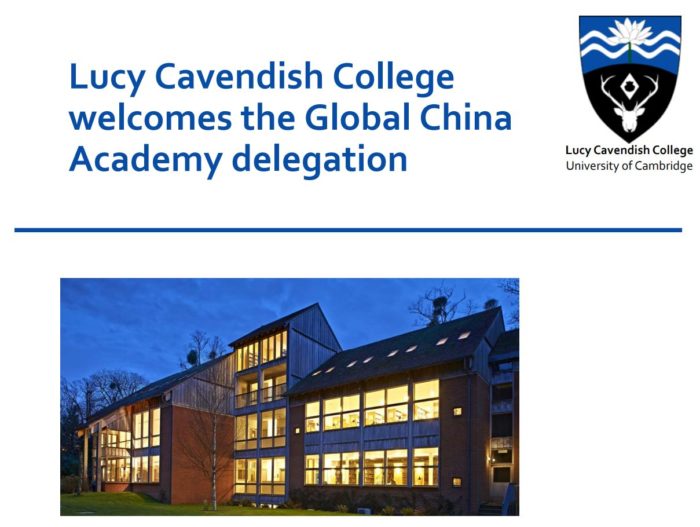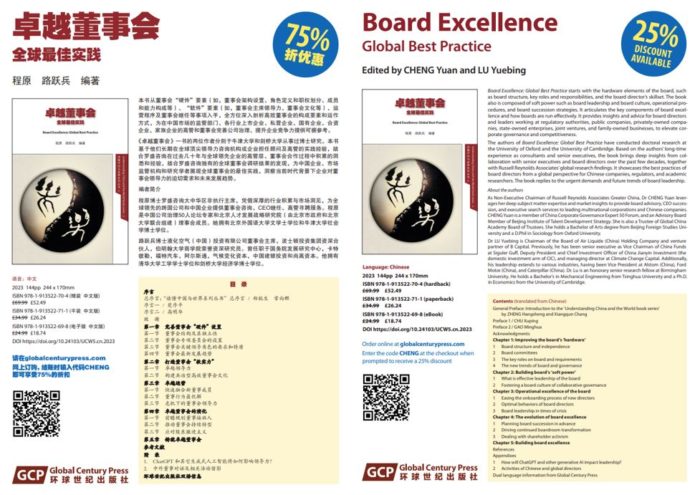
超越:在全球治理中培育卓越的董事会文化
欢迎访问《卓越董事会:全球最佳实践》的官方发布页面,这是一部在公司治理和董事会管理方面树立新标准的开创性作品。该书由程原和路跃兵主编,并由环球世纪出版社于2023年12月31日出版。此书对于寻求在当今企业世界中导航复杂性的董事会董事、政策制定者和商业领袖来说,是必读之作。它提供了有效董事会实践的全面概述,结合研究和现实世界的洞见,以培养领导力、文化和战略规划。把握机会,用这本必备指南提升组织的治理。
本书是中文著作,海外中文版融入了一些英文元素,以满足更广泛的读者群。这是全球世纪出版社的一项特色服务,旨在提高出版物的可及性,使非母语中文读者或正在学习中文的读者也能够接触和理解。通过将英文翻译或摘要与原始中文文本相结合,出版社不仅扩大了其市场,还促进了跨文化理解和欣赏。这一特点对于对中国研究感兴趣的读者尤其有用,因为它允许他们更深入、更有效地与材料互动,无论他们的中文水平如何。
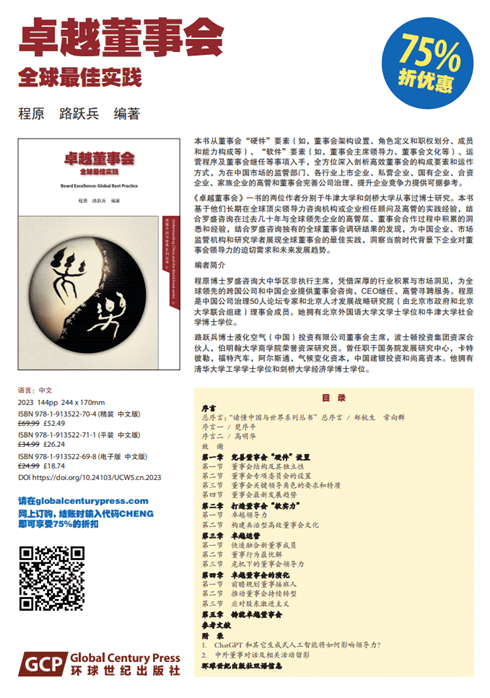
本书提要
本书从董事会“硬件”要素(如,董事会架构设置、角色定义和职权划分、成员和能力构成等)、“软件”要素(如,董事会主席领导力、董事会文化等)、运营程序及董事会继任等事项入手,全方位深入剖析高效董事会的构成要素和运作方式,为在中国市场的监管部门、各行业上市企业、私营企业、国有企业、合资企业、家族企业的高管和董事会完善公司治理、提升企业竞争力提供可据参考。
《卓越董事会》一书的两位作者分别于牛津大学和剑桥大学从事过博士研究。本书基于他们长期在全球顶尖领导力咨询机构或企业担任顾问及高管的实践经验,结合罗盛咨询在过去几十年与全球领先企业的高管层、董事会合作过程中积累的洞悉和经验,结合罗盛咨询独有的全球董事会调研结果的发现,为中国企业、市场监管机构和研究学者展现全球董事会的最佳实践,洞察当前时代背景下企业对董事会领导力的迫切需求和未来发展趋势。
编者简介
程原 博士,罗盛咨询大中华区非执行主席,凭借深厚的行业积累与市场洞见,为全球领先的跨国公司和中国企业提供董事会咨询、CEO继任、高管寻聘服务。程原是中国公司治理50人论坛专家和北京人才发展战略研究院(由北京市政府和北京大学联合组建)理事会成员。她也是全球中国学术院信托会成员。她拥有北京外国语大学文学士学位和牛津大学社会学博士学位。
路跃兵 博士,液化空气(中国)投资有限公司董事会主席,波士顿投资集团资深合伙人,伯明翰大学商学院荣誉资深研究员。曾任职于国务院发展研究中心,卡特彼勒,福特汽车,阿尔斯通,气候变化资本,中国建银投资和尚高资本。他拥有清华大学工学学士学位和剑桥大学经济学博士学位。
目 录
序言
总序言:“读懂中国与世界系列丛书” 总序言 / 郑杭生 常向群
序言一 / 楚序平
序言二 / 高明华
致 谢
第一章 完善董事会“硬件”设置
第一节 董事会结构及其独立性
第二节 董事会专项委员会的设置
第三节 董事会关键领导角色的要求和特质
第四节 董事会最新发展趋势
第二章 打造董事会“软实力”
第一节 卓越领导力
第二节 构建共治型高效董事会文化
第三章 卓越运营
第一节 快速融合新董事成员
第二节 董事行为最优解
第三节 危机下的董事会领导力
第四章 卓越董事会的演化
第一节 前瞻规划董事接班人
第二节 推动董事会持续转型
第三节 应对股东激进主义
第五章 铸就卓越董事会
参考文献
附 录
1. ChatGPT 和其它生成式人工智能将如何影响领导力?
2. 中外董事对话及相关活动留影
环球世纪出版社双语信息
1. 提要和作者
2. 目录
3. 关于本系列丛书
4. 环球世纪出版及其独有特色
4.1 本社以全球和转文化视野创造了双语服务的独有特色
4.2 本社汉英双语显示体例
4.3 本社汉英双语排版标点符号用法
4.4 本社中文及相关名字英文显示体例
5. 环球世纪出版社出版的其它系列丛书
在我们结束对《卓越董事会:全球最佳实践》一书的简介时,我们强调此书作为当代及未来董事会领导力的基石角色。环球世纪出版社出版的海外中文版带有独特的出版社双语特色介绍,并由编者在2021年大陆中文版基础上略有更新,为实现公司治理卓越提供了丰富的知识和实用策略。我们鼓励您翻阅其页面,以发掘成功董事会管理的秘诀。立即点击此页获取您的一本,开始向有效治理和提升组织绩效的旅程迈进。
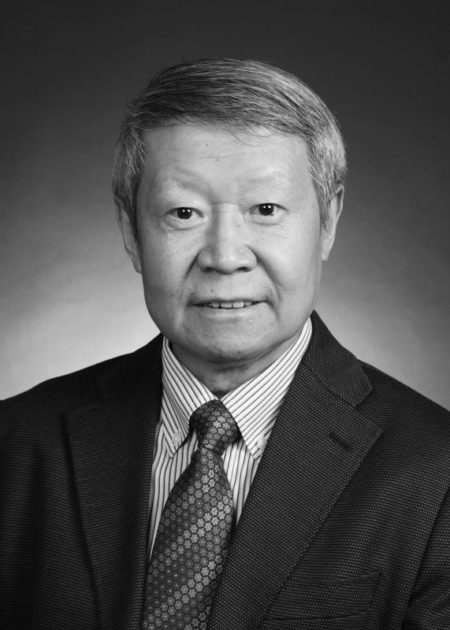
GCA’s Memorial Page for Professor LI Qiang (1950–2023), Chinese Chair of the Global China Aacademy Council
In Memoriam: Professor LI Qiang (1950-2023)
On December 12, 2023, we were deeply saddened to learn the Founding Fellow of the Global China Academy (GCA), Chinese Chair of the Global China Academy Council, and Distinguished Professor at Tsinghua University, China. Professor LI Qiang passed away in Beijing at 14:19, following an illness that did not respond to treatment, at the age of 73.
Professor LI Qiang was a luminary in the field of sociology, holding the esteemed position of Lifetime Professor in the Humanities at Tsinghua University, and formerly serving as the Dean of the School of Social Sciences. His expertise extended to various domains, including social stratification and mobility, applied sociology, urban sociology, and more. Throughout his illustrious career, Professor Li authored over 20 books and 260 academic papers, making significant contributions to social sciences in China and beyond.
His contributions to Tsinghua University, the academic community in China, and the Global China Academy’s mission to promote Chinese social science globally, are immeasurable. His passing marks a significant loss for all these institutions.
Accolades and Contributions
- Director of the Institute of Minsheng Economic Research and the Institute for Contemporary China Studies, Tsinghua University.
- Former Dean of the Department of Sociology, Tsinghua University, and Renmin University.
- Member of the Social Sciences Committee of the Ministry of Education and the Advisory Committee for State Informatization.
- Convener of the sixth and seventh Academic Degrees Committee of the State Council.
- President of the Chinese Sociological Association.
- Recipient of numerous academic awards, including the Ministry of Education’s National Award for Outstanding Achievements in Humanities and Social Sciences Research and the ‘National Social Science Fund Project Outstanding Achievement Award’.
Tributes and Condolences
Following his passing, Professor XIE Lizhong, Chinese President of the Global China Academy, and Professor Xiangqun Chang, President of the GCA, sent a joint letter of condolence on December 12, 2023. Professor Martin Albrow, Founding and Past Honorary President, also wrote a letter of condolence with Professor Xiangqun Chang, expressing both personal and institutional grief over the loss.
Professor LI Qiang’s wife, ZHANG Hua, in her response to these letters, shared her grief over the loss of her husband. She mentioned that Professor Li Qiang had been battling health issues exacerbated by repeated COVID-19 infections over the past year. She expressed her heartbreak over his sudden passing and resolved to celebrate his life and legacy.
Professor Li Qiang’s intellectual legacy, his compassionate heart, and his unwavering dedication to sociology and education will be remembered and cherished by all who had the privilege of knowing him and learning from him.
Click here to visit website of the School of Social Sciences at Tsinghua University.
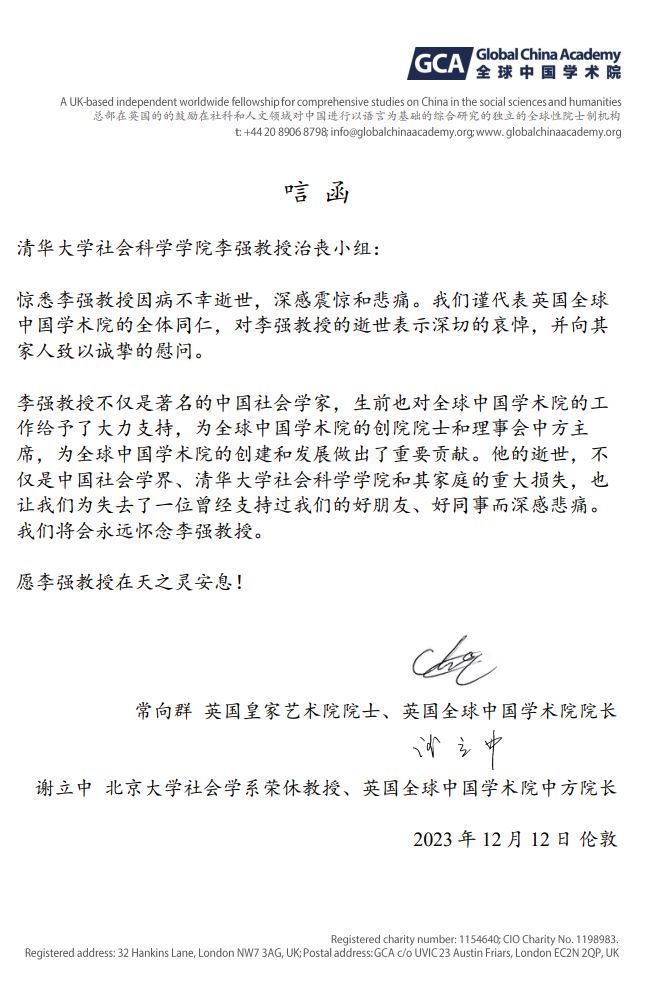
唁 函
清华大学社会科学学院李强教授治丧小组:
惊悉李强教授因病不幸逝世,深感震惊和悲痛。我们谨代表英国全球中国学术院的全体同仁,对李强教授的逝世表示深切的哀悼,并向其家人致以诚挚的慰问。
李强教授不仅是著名的中国社会学家,生前也对全球中国学术院的工作给予了大力支持,为全球中国学术院的创院院士和理事会中方主席,为全球中国学术院的创建和发展做出了重要贡献。他的逝世,不仅是中国社会学界、清华大学社会科学学院和其家庭的重大损失,也让我们为失去了一位曾经支持过我们的好朋友、好同事而深感悲痛。我们将会永远怀念李强教授。
愿李强教授在天之灵安息!
常向群 英国皇家艺术院院士、英国全球中国学术院院长
谢立中 北京大学社会学系荣休教授、英国全球中国学术院中方院长
2023年12月12日 伦敦
Condolence
Professor Li Qiang’s Funeral Group of the School of Social Sciences at Tsinghua University,
We are shocked and deeply saddened to learn of the unfortunate passing of Professor LI Qiang due to illness. On behalf of all colleagues at the Global China Academy, we express our profound condolences for the passing of Professor LI Qiang and extend our sincere sympathies to his family.
Professor Li Qiang was not only a renowned Chinese sociologist, but he also provided significant support to the work of the Global China Academy (GCA) during his lifetime. As a founding fellow and the Chinese Chair of the GCA Council, he made important contributions to the establishment and development of the Academy. His passing is a great loss not only to the Chinese sociological community, School of Social Sciences of Tsinghua University, and his family, but also to us for losing a good friend and colleague who once supported us. We will always cherish the memory of Professor LI Qiang.
May Professor Li Qiang’s spirit rest in peace in heaven!
Xiangqun Chang FRSA FGCA
President of the Global China Academy
Distinguished Professor of Nankai University
XIE Lizhong FGCA
Emeritus Professor of Sociology at Peking University
Chinese President of the Global China Academy
12 December, 2023, London
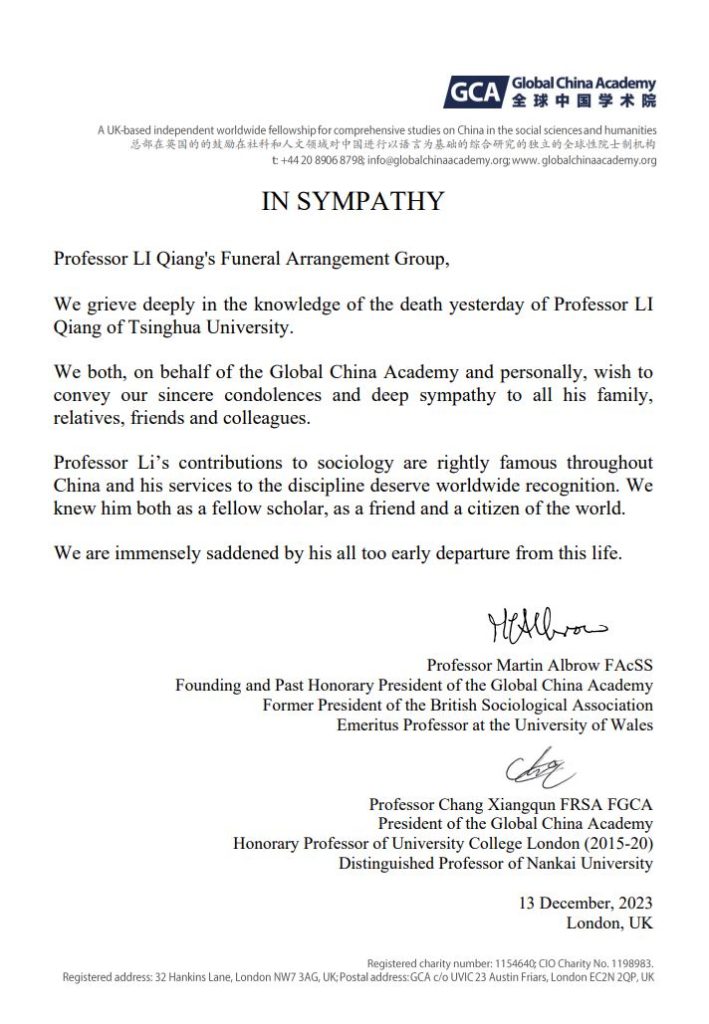
IN SYMPATHY
Professor LI Qiang’s Funeral Arrangement Group,
We grieve deeply in the knowledge of the death yesterday of Professor LI Qiang of Tsinghua University.
We both, on behalf of the Global China Academy and personally, wish to convey our sincere condolences and deep sympathy to all his family, relatives, friends and colleagues.
Professor Li’s contributions to sociology are rightly famous throughout China and his services to the discipline deserve worldwide recognition. We knew him both as a fellow scholar, as a friend and a citizen of the world.
We are immensely saddened by his all too early departure from this life.
Professor Martin Albrow FAcSS
Founding and Past Honorary President of the Global China Academy
Former President of the British Sociological Association
Emeritus Professor at the University of Wales
Professor Chang Xiangqun FRSA FGCA
President of the Global China Academy
Honorary Professor of University College London (2015-20)
Distinguished Professor of Nankai University
13 December, 2023, London, UK
Chinese translation 中文翻译:
致哀
李强教授治丧小组,
惊闻清华大学李强教授昨天逝世,我们深表哀悼。
我们仅代表全球中国学术院以及个人的名义,向他的家人、亲属、朋友和同事表示诚挚的哀悼和深切的慰问。
李教授对社会学的贡献在中国广为人知,他对这一学科的服务理应获得全世界的认可。对我们而言,他既是学者,也是朋友和世界公民。
我们对他过早离开这个世界感到无比悲痛。
马丁·阿尔布劳教授
英国社会科学院院士
全球中国学术院创始及前荣誉院长
英国社会学学会前会长
威尔士大学荣休教授
常向群教授
英国皇家艺术院院士
全球中国学术院院士及院长
伦敦大学学院荣誉教授(2015-20)
南开大学特聘教授
2023年12月13日, 英国伦敦
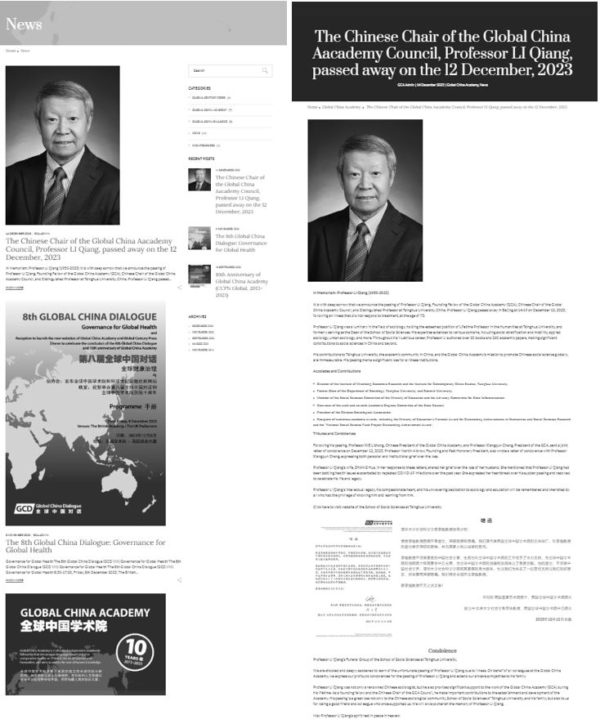
To mourn the unfortunate passing of Professor LI Qiang, the Chinese Chair of the Global China Academy Council, on December 12, 2023, the Global China Academy’s website immediately turned to a monochrome grey for one week. At the same time, condolences and obituaries from the Presidents of the Academy and former Honorary President were issued to the Tsinghua University Professor LI Qiang Funeral Committee, and a dedicated memorial webpage was created.
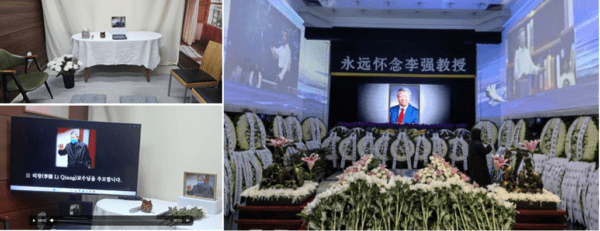
Professor Xiangqun Chang shared the aforementioned memorial webpage with Professor Han Sang-jin of Sociology from Seoul National University. Immediately, Professor Han set up a small altar at his home to honour the memory of Professor Li Qiang, placing a bunch of white chrysanthemums in front to symbolize his distant remembrance. Furthermore, he held a funeral parlor open all day on Saturday at his institute on the December 16 when LI Qiang’s farewell ceremony was held in Babaoshan, Beijing. He also forwarded us his memorial article written in English. The Chinese-translated version has been published on the Tsinghua University website. The photo on the bottom right, showing the farewell ceremony hall for Li Qiang, was received from Professor Han Sang-jin. This gesture of remembrance and respect from colleagues and friends underscores the profound impact Professor Li had on those around him.

This group of pictures was created for the Global China Academy 2023 report (p31-32). The photo on the right was taken in 2007 during Professor LI Qiang’s visit to the UK. He is pictured in front of a giant pine tree, which symbolizes longevity and immortality, resilience and steadfastness, and purity and integrity in Chinese culture. He will be remembered in our hearts, much like the enduring spirit of the pine tree.
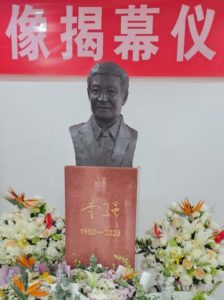
In loving memory of Professor Li Qiang — a distinguished sociologist whose profound academic legacy and noble character continue to inspire — the Department of Sociology at the School of Social Sciences, Tsinghua University, held a statue unveiling ceremony on April 26, 2025, during the university’s 114th anniversary celebration. Faculty, students, and guests from all walks of life gathered to honor his life and work, and to witness a moment filled with reverence and remembrance. May Professor Li’s spirit live on in our thoughts and actions, ever present among us in a different form, guiding and inspiring future generations.
深情缅怀李强教授——这位杰出的社会学家,其深远的学术遗产与高尚的人格风范至今仍激励人心。2025年4月26日,值清华大学建校114周年之际,清华大学社会科学学院社会学系举行了李强教授铜像揭幕仪式。学院师生与来自社会各界的嘉宾齐聚一堂,缅怀李教授的生命历程与学术贡献,见证了这一庄重而充满敬意的时刻。愿李强教授的精神,在我们的思想与行动中长存;他以另一种方式与我们同在,继续指引和激励未来一代。
- Click here to watch a video of Professor LI Qiang’s greeting for the launch of the Global China Academy as an academy at the 7th Global China Dialogue, on December 10th, 2021, at the British Academy.
- Click here to view the page ‘GCA Life Fellow Korean Sociologist Professor HAN Sang-Jin Meeting Professor Xiangqun Chang at Seoul, January 2023.’
- Click here to view Professor LI Qiang FGCA page.
- Click here to visit the GCA news & blog section.
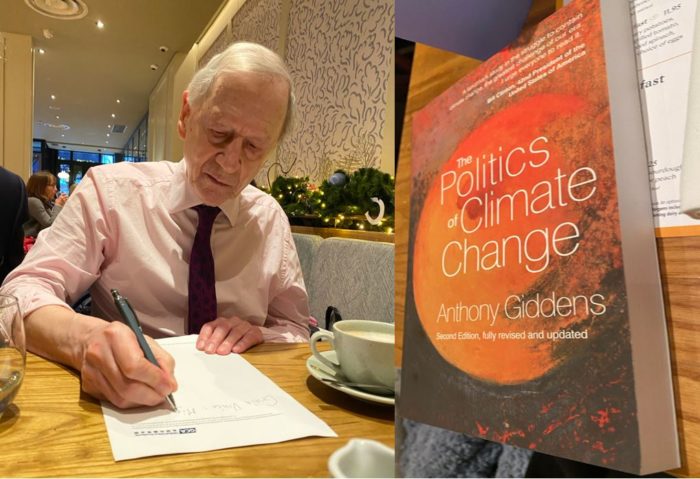
New Co-Chair of GCA Council Meets with Professor Lord Anthony Giddens and GCA Trustees Respectively
On the occasion of GCA Council’s Co-Chair Dr. Qian Zhenhua’s visit to the UK, in addition to participating in the 8th Global China Dialogue and celebrating the 10th Anniversary of the Global China Academy, we also arranged some academic visits and meetings.
On the morning of the 11th December, Professor Martin Albrow (left in the left photo) arranged a meeting with Professor Lord Anthony Giddens (right in the right photo) at Côte, Sloane Square. Professor Giddens gave a copy of his book, The Politics of Climate Change (second and revised edition), to Dr Qian and began to discuss COP 28. He explained that it is the 28th United Nations Climate Change Conference (COP28), which was held in Dubai, UAE, from November 30 to December 13, 2023. The key focuses include fast-tracking energy transitions, revamping climate finance, prioritizing nature and livelihoods, and promoting inclusive participation. The first Global Stocktake of the Paris Agreement’s implementation is highlighted, aiming to assess global progress towards climate goals.

During the meeting, Professor Giddens also provided an reference to both Professor Chang and Dr Qian. It is Nomad Century: How to Survive the Climate Upheaval, by Gaia Vince. It emphasizes the urgent need for global preparation and adaptation strategies in response to climate change-induced migration. Vince argues that as the planet warms, vast populations will need to relocate to more habitable regions, necessitating international cooperation and innovative solutions to ensure these migrations are managed safely and equitably. The book highlights the importance of viewing climate migration not as a crisis to be averted but as an opportunity for societal transformation and resilience building, advocating for proactive measures to support affected communities and foster a sustainable future. Dr Qian mentioned that his company uses environmentally friendly materials for building and refurbishment. They are also digitizing office documents, including accounting and legal documents, to save paper. As President of the Shanghai International Cooperation Association of SMEs, he is promoting environmentally friendly practices and digitalization to all member companies.

On the afternoon, Dr QIAN Zhenhua (left in the left photo) met with Dr Thomas Clarke (middle in the left photo), Treasurer of the GCA Board of Trustees, at the GCA Centre. Dr Clarke expressed his concern about the complicated geopolitical relationship between China and the world. They discussed issues including the status of Taiwan, disputes in the South China Sea, and territorial conflicts with neighboring countries. The South China Sea, an important trade route, is disputed by several countries. Relations between ASEAN countries and China are mixed; some countries are close to China, while others are wary of its influence. China’s rise has shifted the balance of international relations, creating new alliances and oppositions. Dr Clarke continued, saying that the Renaissance and the Enlightenment laid the foundation for human liberty and democracy, yet as democracy has evolved, it now faces numerous challenges such as the resurgence of nationalism, political polarization, economic inequality, global health issues, artificial intelligence, and the problem of fake news in the information age. He asked for Dr Qian’s opinions on how China and the Chinese people can contribute to the ongoing quest for balance and progress in human society. Dr Qian said that he was very impressed that Dr Clarke, as a natural scientist, possesses a global and historical vision. For him, it is difficult for Chinese people to do much given the current situation inside and outside China.
On the morning of the 12th December, Professor Xiangqun Chang and Dr QIAN Zhenghua (left in the right photo) visited the Centre for European Reform (CER) at Great College Street, Westminster. They met the Centre Director Charles Grant (middle in the right photo), Trustee of Global China Academy. According to Mr. Grant, RCR is a London-based think tank that focuses on matters of European integration. It also researches on China and Asia, which explores the complex geopolitical dynamics of the region, including the strategic relationships between China, its neighbours, and the West. Topics cover the impact of China’s rise on global trade, security, and political landscapes, the challenges and opportunities this presents for Europe, and the evolving partnerships and rivalries in the Indo-Pacific. The research emphasizes the need for strategic responses to China’s policies and actions, as well as collaboration between European nations and their Asian counterparts to address shared concerns and promote stability and prosperity in the region. He also told Dr Qian that he visited China many times and maintains good relationship with Institute of European Studies of Chinese Academy of Social Sciences (CASS). Dr Qian offered to hold a conference on common interests collaboratively in Shanghai.
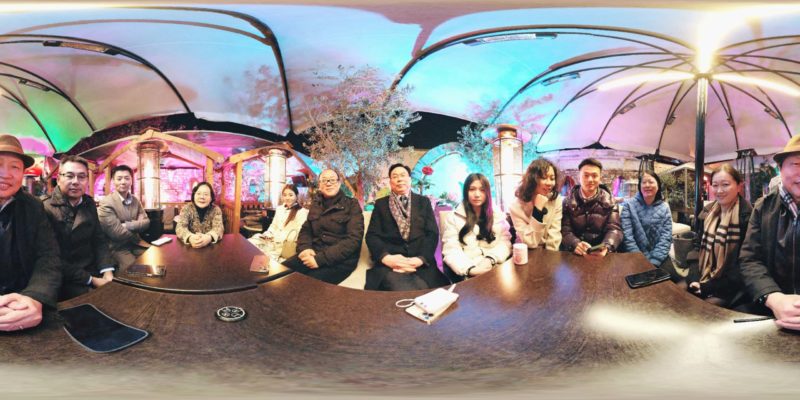
The farewell event was held in the tranquil Shisha Garden of The Madonna Halley Hotel in Edgware, where Chinese GCD8 speakers, attendees, and the GCA team anticipating delicious Mediterranean fusion cuisine, featuring locally sourced ingredients, homemade desserts and cocktails rich in authentic flavors. The photo was taken with the AI Smartphone Stabilizer, Insta 360 Flow, by Alan Fang, the GCA legal adviser, who is positioned at each end of the photo.
- Click here to view the photo report of the 8th Global China Dialogue, from which PPTs or speech notes can be downloaded.
- Click here to view the photo report of the Global China Academy’s 10th-anniversary celebration, from which speech notes can be downloaded.
- Click here to visit the GCD 8 Website.
- Click here to visit the GCA News section.
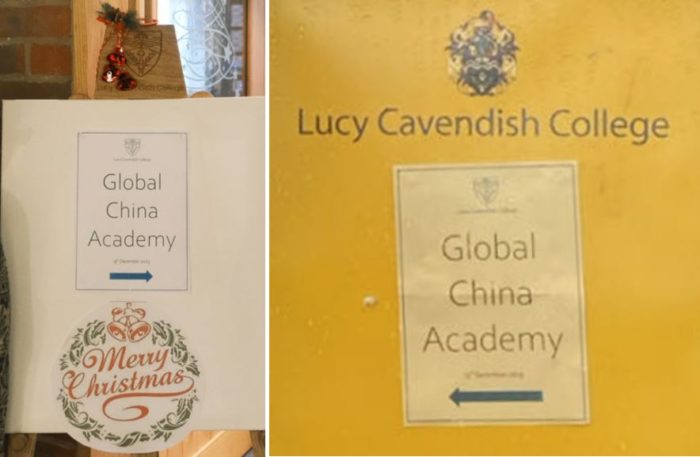
A Warm Welcome for Global China Academy Delegations at Lucy Cavendish College, Cambridge
On the afternoon of December 9th, 2023, the Global China Academy delegation visited the University of Cambridge and received a warm welcome. An emblem of the Global China Academy was displayed in front of a building and outside of the Warburton Hall. The featured photo in this news article showcases it.
The delegates included Professor Xiangqun Chang, President of the Global China Academy; Professor LI Linxue, Dean of the College of Arts and Media at Tongji University, China, and GCD8 speaker; Professor QIAN Yufang, Director of the Institute of Corpus and Discourse Studies at Zhejiang Gongshang University, China, and GCD8 speaker; Dr LIAO Nong, Chief Physician of the Department of Plastic and Cosmetic Surgery at the Third Affiliated Hospital of Guangzhou Medical University, China, and GCD8 speaker; Dr QAIN Zhenhua, Co-Chair of the Global China Academy Council; David Liu, GCA Domestic Manager and Manager of the Brocket Hall Club; Alan Fang, GCA Legal adviser; Katie Zheng, GCA Administrator Manager; SHA Yuze, PhD Candidate at Lancaster University and GCA volunteer; WANG Conghan, PhD student at Zhejiang Gongshang University and GCA volunteer; Ting Zhang, Founder and CEO of Crayfish.io Ltd., MENG Jialin and NAN Yuhang, GCA volunteers. The visit was arranged through GCA friend LI Li, Fellow of Lucy Cavendish College, University of Cambridge.
Agenda
- 12:30 – 13:30 Visit King’s College – meet Dr Niamh Mulcahy (Bye- Fellow LCC and member of Kings College) and Dr Jane Greatorex (Senior Tutor LCC) at the Front Gate of Kings College. Guided tour to include the outside of the Chapel, Front Court, the Xu Zhimo Memorial Garden (https://www.atlasobscura.com/places/xu-zhimo-memorial-kings-college) and the Hall. We will walk to Lucy Cavendish College.
- 14:00 Arrival LCC. Meet the President, Prof Dame Madeleine Atkins, at Warburton Hall. Short presentation in the Reception Rooms in Warburton Hall about the College, its ambitions and the Library as the teaching hub. Tea, Coffee etc to be served.
- 14:45 – 15:30 Tour of Library & teaching spaces – Dr Greatorex to take guests round the library, reading rooms, Enterprise Hub, Zoom booth
- 15:30 Afternoon tea with LI Li at Marshall House

The GCA delegation, accompanied by Dr Mulcahy and Dr Greatorex, visited the Chapel, Front Court, the Hall, and the Xu Zhimo Memorial Garden at King’s College. It was a special treat to access the riverbank to take the group photo with the back view of King’s College (the bottom right photo).
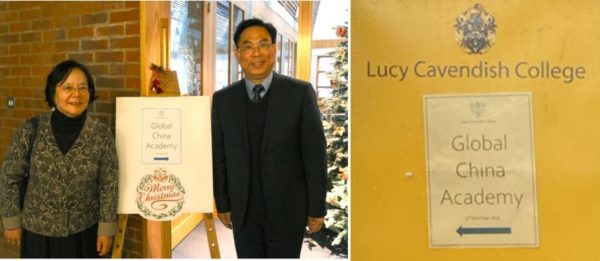
The delegation noticed the post for the ‘Global China Academy’ outside the main building of Lucy Cavendish College and followed the arrow to enter the meeting room. Outside the room, the post featuring ‘Global China Academy’ was decorated with Christmas ornaments (top two photos). Printed handouts were placed on the chairs for each delegate. The image above is the cover of a presentation prepared for the GCA delegation about Lucy Cavendish College. Upon seeing the post and handouts with ‘Global China Academy’, we felt they treated GCA with respect and were filled with anticipation for the collaboration ahead. Click the image above to download the PDF file.
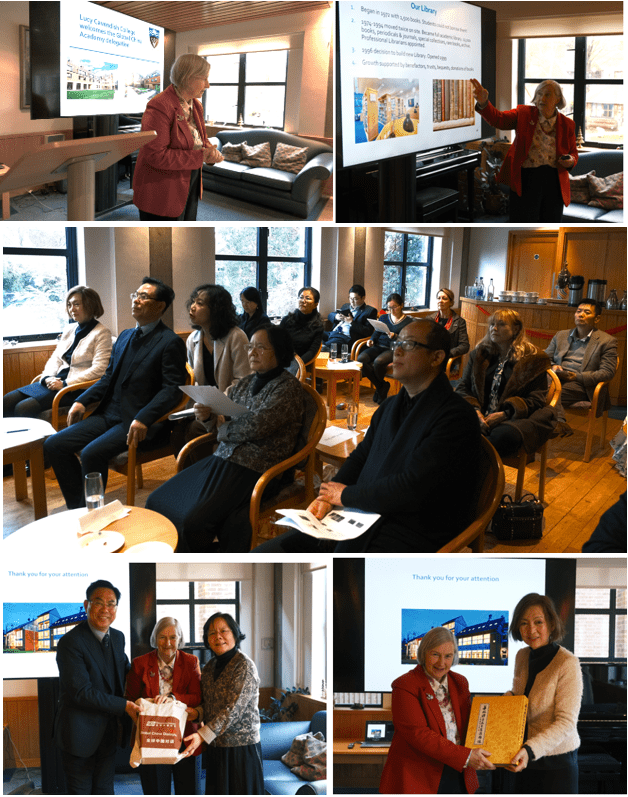
The top two photos showcase a presentation about Lucy Cavendish College by its President, Professor Dame Madeleine Atkins. The delegation participated in the presentation (middle photo). After presentation, Professor Xiangqun Chang presented the Global China Dialogue brochure to Professor Dame Atkins, highlighting the global vision and commitment to the UN Sustainable Development Goals written within, indicating that the Global China Academy (GCA) and Lucy Cavendish College (LLC) share common interests. She was particularly impressed by LLC’s dedication to creating future global leaders and innovators with entrepreneurial mindsets and a commitment to making a ‘positive impact’ on humankind and the planet. Along with Dr Qian Zhenhua, Professor Chang expressed their great appreciation with gifts to Professor Dame Atkins (bottom left photo). LI Li also presented her book as a gift to the President (bottom right).
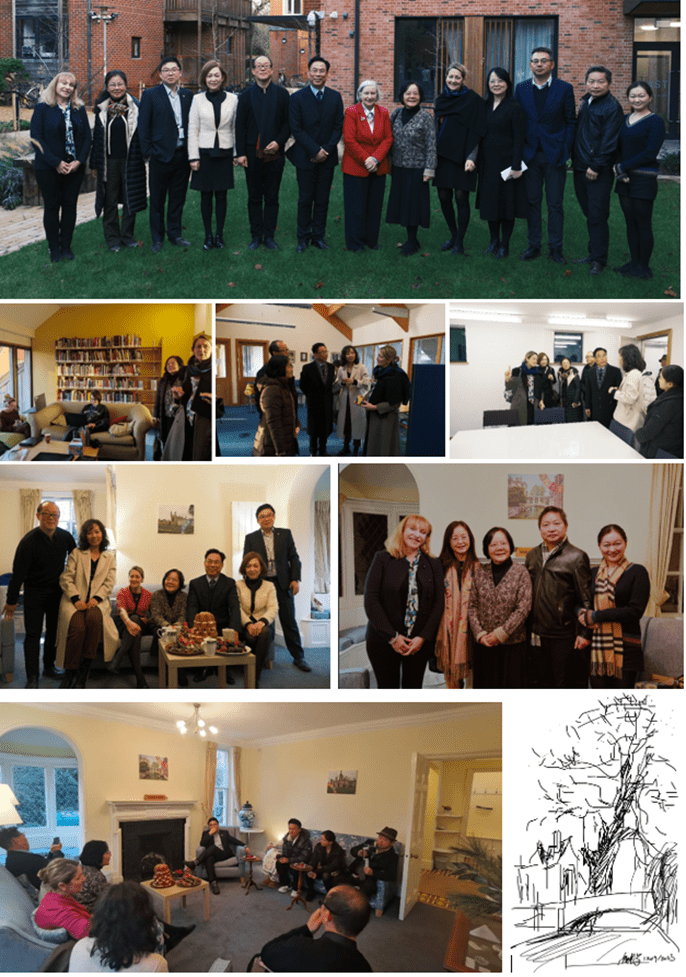
After enjoying drinks and mince pies, a group photo was taken in the courtyard (top). Dr. Greatorex then guided us through the library, reading rooms, Enterprise Hub, and Zoom booth (second row of photos). Afterwards, we enjoyed afternoon tea with Li Li at Marshall House. The rest of the photos, except for the sketch of the tree, were drawn by Professor Li Linxue at the bottom right.
The visit of the Global China Academy delegation to the University of Cambridge on December 9th, 2023, received a warm welcome. The emblem of the Global China Academy was displayed during the visit, highlighting the importance of the occasion. Delegates participated in various activities and presentations, establishing the connections between the institutions. The visit fostered a relationship between the two entities and represented a significant step forward in academic collaboration. As the delegation bid farewell to Cambridge, the memories captured in photos and sketches will serve as lasting reminders of the productive exchange and shared goals for the future.
- Click here to view the photo report of the 8th Global China Dialogue, from which PPTs or speech notes can be downloaded.
- Click here to view the photo report of the Global China Academy’s 10th-anniversary celebration, from which speech notes can be downloaded.
- Click here to visit the GCD 8 Website.
- Click here to visit the GCA News section.
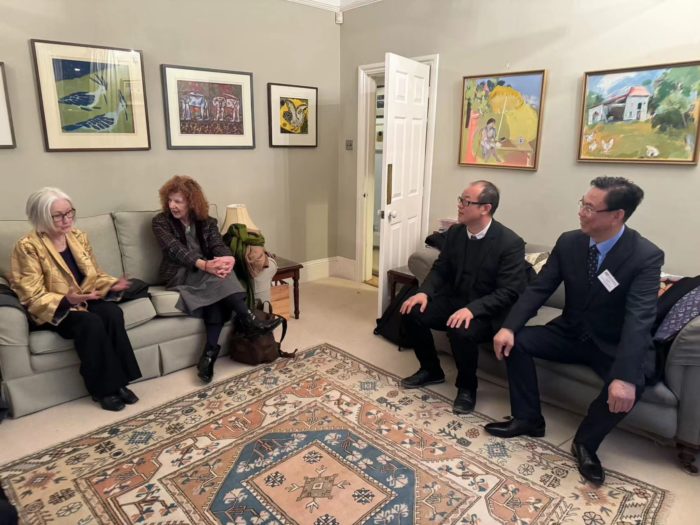
GCD8 Speakers and Participants Well Received by GCA Fellows at Oxford
On the afternoon of December 8th, 2023, some speakers and volunteers of the 8th Global China Dialogue visited the University of Oxford and were well received by GCA Fellows. They are Professor LI Linxue, Dean of the College of Arts and Media, Tongji University, China; Dr QIAN Zhenhua, Co-Chair of the Global China Academy Council and President of the Shanghai International Corporation Association of SMEs, China; and MENG Jialin and NAN Yuhang (volunteers).
Agenda
- 14:00 meet at the Christ Church College Entrance with Professor Maria Jaschok, Senior Research Associate of Contemporary China Studies at OSGA, Oxford; Life Fellow of the Global China Academy. And then visit the Bodleian Library and the Dickson Poon University of Oxford China Centre.
- 16:00 Tea at Professor Robin Cohen’s home. He is Emeritus Professor and Former Director of the International Migration Institute at the University of Oxford, as well as a Senior Research Fellow at Kellogg College; Life Fellow of Global China Academy. Hugo Tai, a PhD student at Oxford, joins everyone there.

Christ Church, a constituent college of the University of Oxford, is one of the most prestigious and iconic colleges in Oxford. Founded in 1546 by King Henry VIII, it has a rich history and architectural significance. Its grand buildings, including Tom Tower and the Great Hall, exemplify traditional Oxford architecture and have been featured in various films and literature, most notably in the Harry Potter series. Christ Church is renowned for its academic excellence and has produced many notable alumni, including statesmen, scientists, writers, and academics. It also has a renowned choir and is home to the Christ Church Cathedral, which adds to its cultural and religious significance.
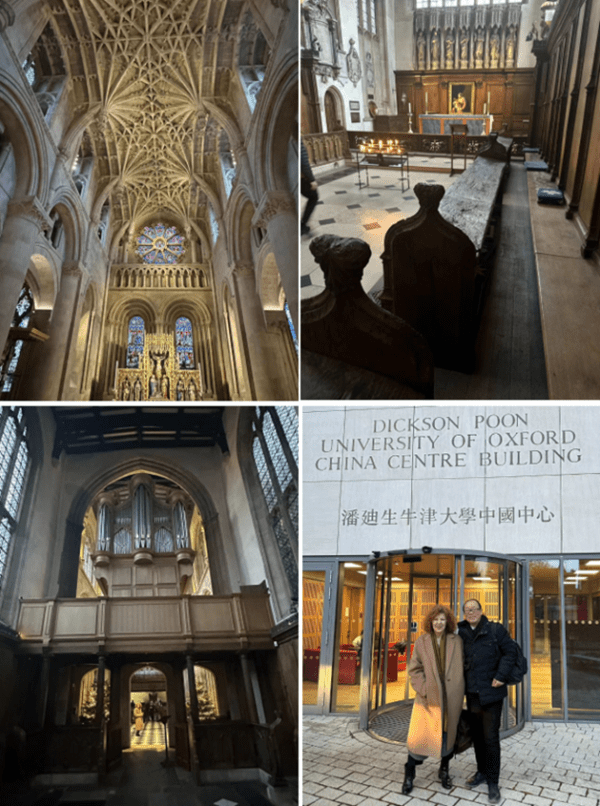
Professor Li Xuelin, an architect, and Professor Jaschok, an anthropologist, engaged in dialogues, enjoying the rich history, beautiful architecture, and academic excellence of the place.
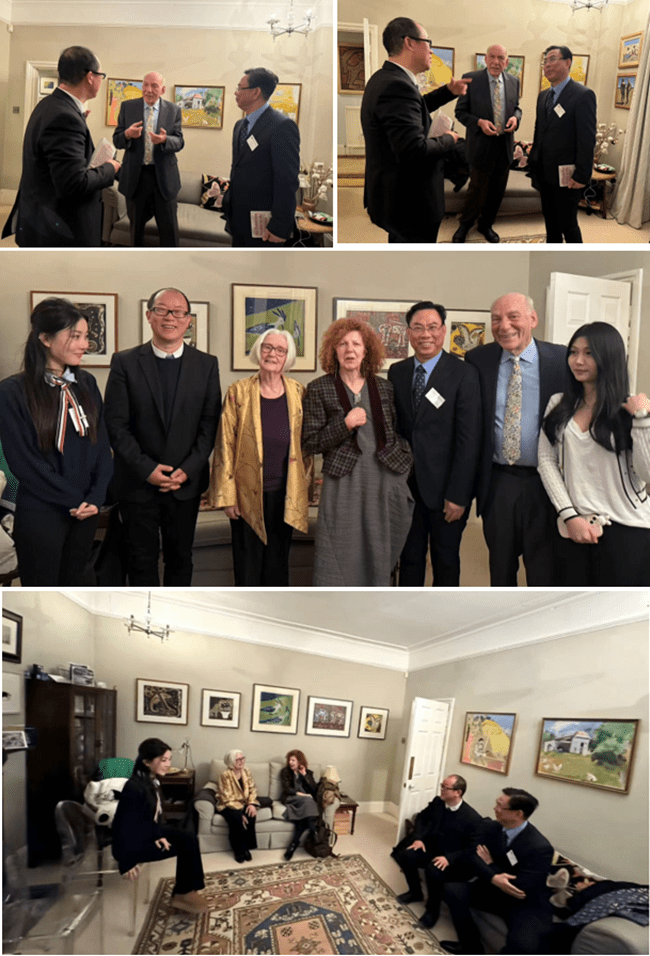
Professor Robin Cohen (middle in the top two photos) conversed with Professor LI Linxue and Dr QIAN Zhenhua. Mrs Selina Cohen (3rd left in the middle photo) from Oxford Publishing Services hosted tea for the guests. Professor Jaschok (middle in the bottom photo) engaged in conversation with Mrs Cohen.
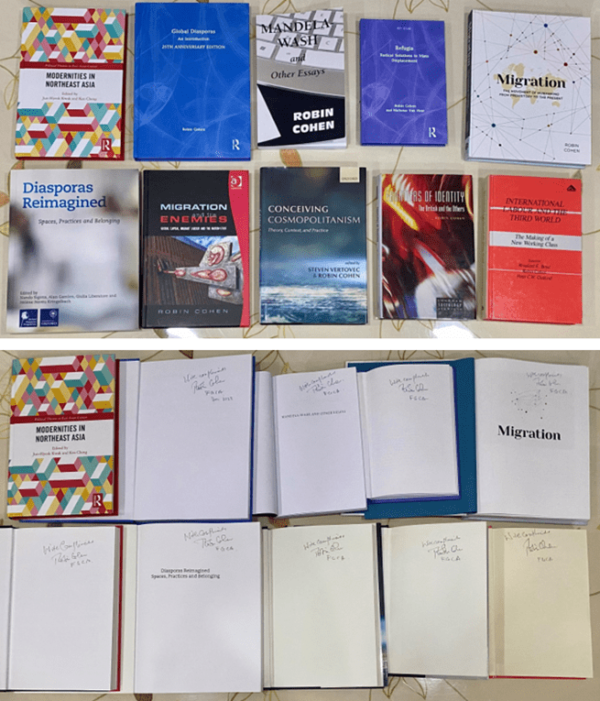
Professor Cohen donated his books to the Global China Academy, signing it as FGCA (Fellow of the Global China Academy). Click here to see more details about the book.
Our speakers and volunteers from the 8th Global China Dialogue, who visited the University of Oxford, were warmly welcomed by the fellows of the Global China Academy. They expressed their deepest gratitude to Professor Maria Jaschok for the exceptional guided tour. This tour, enriched by special access and illuminated through her insightful knowledge, has significantly deepened our understanding and appreciation of the explored subjects. Professor Jaschok’s expertise, coupled with her willingness to share, has been truly enlightening. We are immensely grateful for her generosity and dedication, and cherish the invaluable opportunity to have learned under her guidance. They also enjoyed a tea event at Professor Robin Cohen’s home, where there was lively exchange and conversation. Professor Cohen, a fellow of the Global China Academy, generously donated his books to the academy. This enriching visit, culminating in Professor Cohen’s generous book donation, not only facilitated profound academic and cultural exchanges but also left an indelible mark on the participants, weaving books into the fabric of their shared memories and laying a strong foundation for future collaborations.

After the 8th Global China Dialogue, Professor Xiangqun Chang, along with a speaker and a volunteer, visited the University of Oxford one evening. Pictured are Dr. Liao Nong (on the left), Chief Physician of the Department of Plastic and Cosmetic Surgery at the Third Affiliated Hospital of Guangzhou Medical University, China, and a speaker at the GCD8; and Li Li (on the right), a Fellow of Lucy Cavendish College, University of Cambridge. The background features the Radcliffe Camera, within the Bodleian Library.
The Bodleian Library is one of the oldest libraries in Europe, located in Oxford, England. It is part of the University of Oxford and consists of several buildings, including the iconic Radcliffe Camera. With a history dating back to the 14th century, the Bodleian Library is renowned for its vast collection of books, manuscripts, and other academic materials. It serves as a major research library and cultural institution, attracting scholars and visitors from around the world. The Radcliffe Camera is a historic building in Oxford, England, known for its distinctive circular shape and impressive architecture. Completed in 1749, it was designed by James Gibbs and serves as a reading room for the Bodleian Library. The building is part of the University of Oxford and is a popular landmark in the city, attracting visitors with its elegant design and rich history.
- Click here to view the photo report of the 8th Global China Dialogue, from which PPTs or speech notes can be downloaded.
- Click here to view the photo report of the Global China Academy’s 10th-anniversary celebration, from which speech notes can be downloaded.
- Click here to visit the GCD 8 Website.
- Click here to visit the GCA News section.
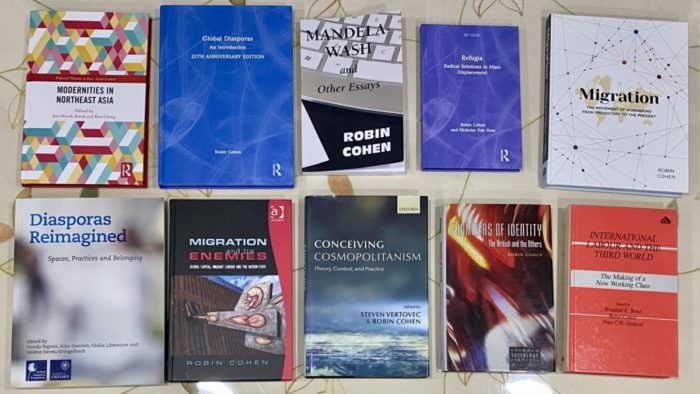
A GCA Fellow’s Donation of Books Enriches the Global China Academy’s Library Collection
In a generous contribution to the academic community, Professor Robin Cohen, a Life Fellow of the Global China Academy (FGCA), has donated an invaluable collection of ten academic books to the GCA library. This significant donation highlights Professor Cohen’s dedication to enhancing education and advancing sociological knowledge through global and regional perspectives.
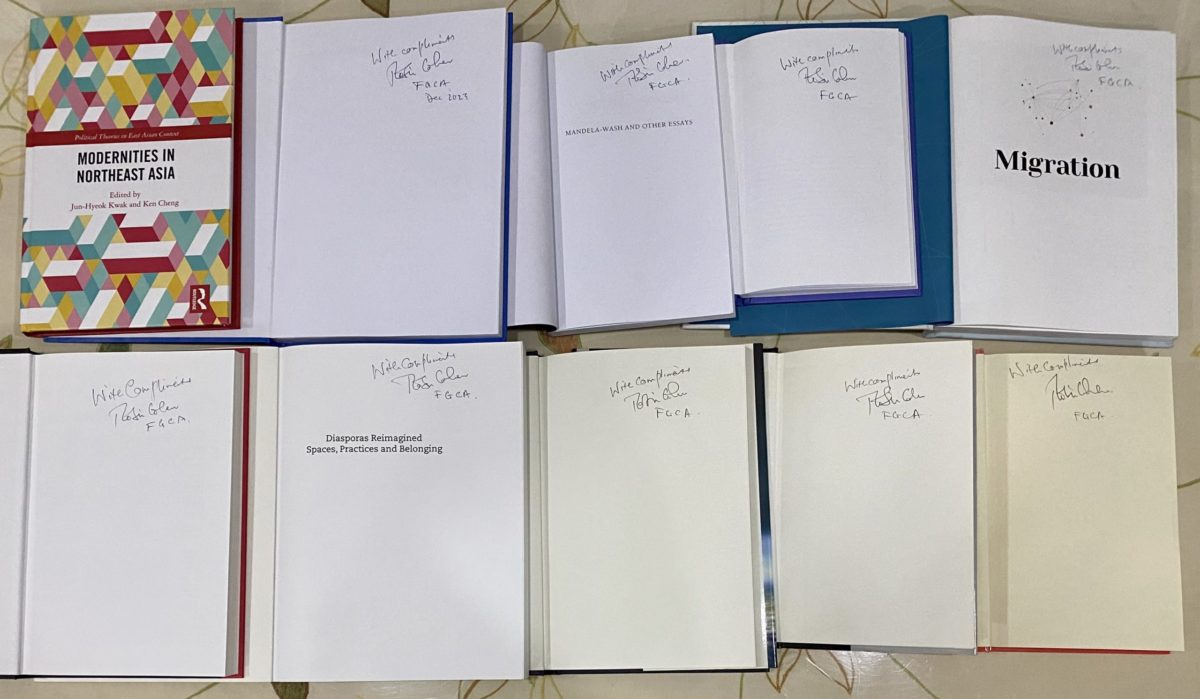
These books, cover various topics, offering insights into global migration, cultural diversity, and the dynamics of international relations. The collection features influential works edited or authored by Robin Cohen and others, encompassing diverse topics in sociology and political science:
- Modernities in Northeast Asia (2024), edited by Jun-Hyeok Kwak and Ken Cheng, provides a transformative view of modernity through the lens of Northeast Asian intellectual and political movements, challenging Western-centric perspectives.
- Global Diasporas: An Introduction (2022) by Robin Cohen, in its 25th anniversary edition, explores the concept of diaspora through case studies of Jewish, Armenian, African, and other diasporas, offering comprehensive guidance for students and scholars.
- Mandela-wash and other essays (2022) by Robin Cohen, is a collection of essays addressing contemporary topics such as vaccine rollouts, electoral reform, and citizenship.
- Refugia: Radical Solutions to Mass Displacement (2020) by Robin Cohen and Nicholas Van Hear, proposes innovative solutions to mass displacement.
- Migration: The Movement of Humankind from Prehistory to the Present (2019) by Robin Cohen, examines various types of migration throughout history.
- Diasporas Reimagined: Spaces, Practices and Belonging (2015), edited by Nando Sigona, Alan Gamlen, Giulia Liberatore, and Hélène Neveu Kringelbach, is a collection of essays from the Oxford Diasporas Programme.
- Migration and its Enemies: Global Capital, Migrant Labour and the Nation-State (2006) by Robin Cohen, explores the interplay between global capital, migrant labor, and national politics.
- Conceiving Cosmopolitanism: Theory, Context, and Practice (2003), edited by Steven Vertovec and Robin Cohen, is a compilation of essays on cosmopolitanism.
- Frontiers of Identity: The British and the Others (1994) by Robin Cohen examines British national identity.
- International Labour and the Third World: The Making of a New Working Class (1987), edited by Rosalind E. Boyd, Robin Cohen, and Peter C. W. Gutkind, discusses the international role of the working class.
Professor Cohen’s donation timed perfectly for the GCA, as the institution continues to expand its resources to support research and learning in sociology and related disciplines. The new additions to the library will be invaluable resources for GCA Fellows, researchers and students, facilitating a deeper understanding of the complex social issues shaping the modern world.
The GCA plans to hold a small ceremony session during the 10th GCA dinner on 8th December to acknowledge Professor Cohen’s contribution. Although the books were not present at the House of Lords for the dinner, the GCA’s website records Professor Cohen’s benevolence and ongoing support for academic excellence. Professor Xiangqun Chang, President of the GCA, expressed profound gratitude for this donation, noting it as an investment in knowledge and future research, particularly in global and comparative perspectives.
Appendixes
- In addition to the aforementioned books, Global Sociology (2017, 2012, 2000) by Robin Cohen and Paul Kennedy is a well-known textbook worldwide. Following the 1st edition, the Chinese edition 《全球社会学》was published in 2001, translated by Wen Jun 文军. It has been introduced to the Chinese academic community as a landmark work:
- creatively integrates existing theoretical traditions in sociology with emerging research perspectives, strongly focusing on contemporary issues and the dynamics of social change.
- offers a highly promising and inspiring new perspective for sociological research, especially in terms of sociological theory and methods. Through a detailed examination of global viewpoints and paradigms, it vividly reiterates the value and vision of sociology in understanding the complex and rapidly changing world in which we live.
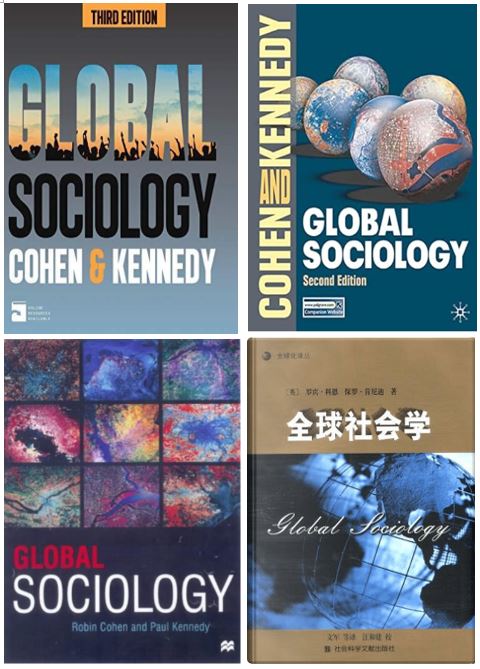
Contrastingly, it’s worth mentioning another book, Global Sociology: Analysis of Transnational Phenomena (2006), by Jiaming Sun of Texas A&M University-Commerce and Xun Wang of University of Wisconsin-Parkside, in the USA. This book is only available in Chinese (《全球社会学: 跨国界现象的分析》, 孙嘉明 王勋 著). It consists of eight chapters covering topics such as formation of global society and global sociology, major theories and schools of global social studies, economic globalization, global social environment, etc
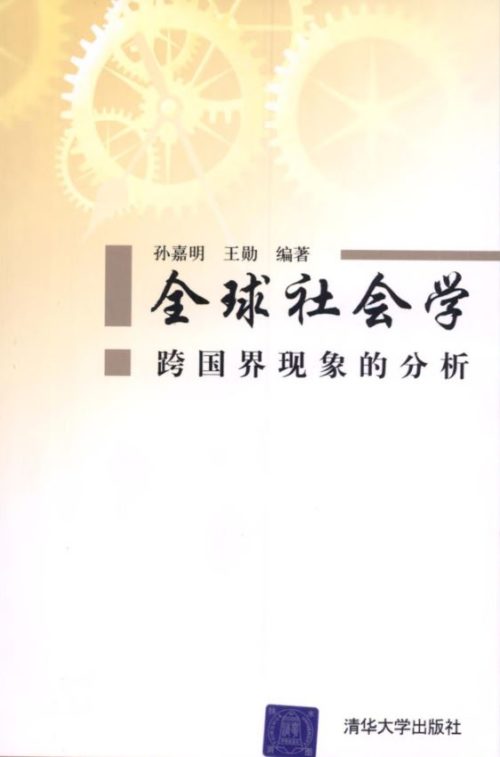
2. News at University of Oxford website: A Fellow for Life: https://www.kellogg.ox.ac.uk/news/a-fellow-for-life 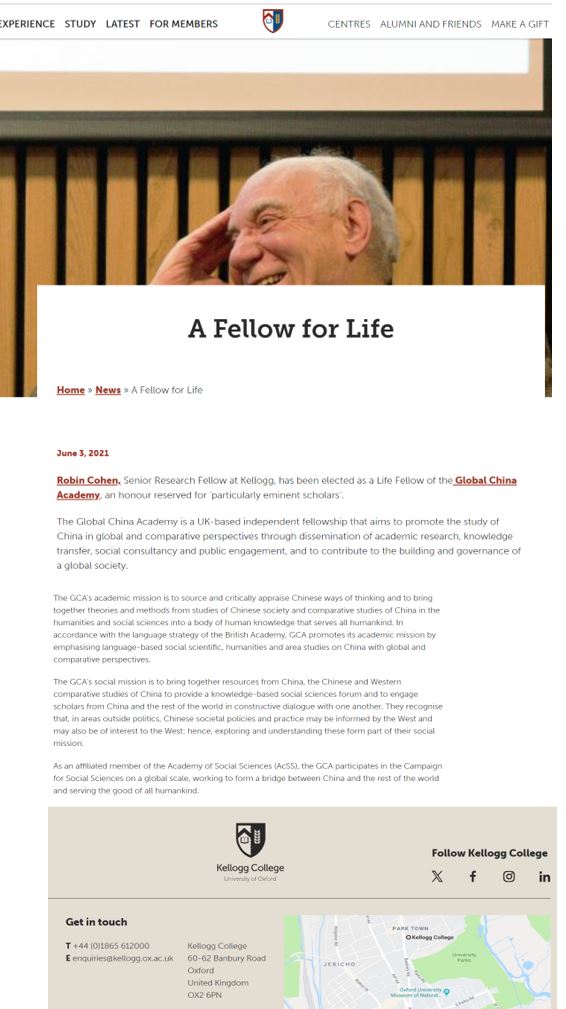
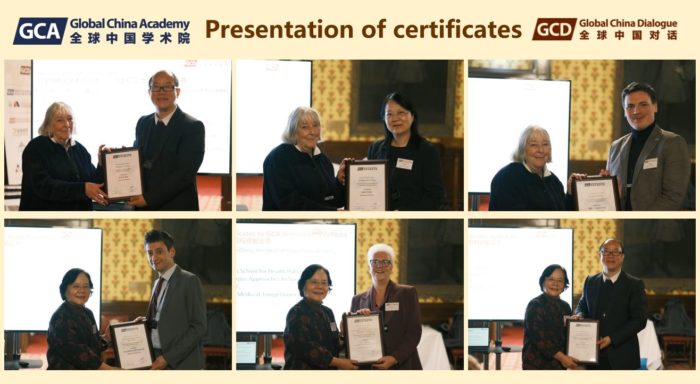
New Fellowship awards ceremony in 2023
At the dinner celebrating the conclusion of the 8th Global China Dialogue and the 10th Anniversary of the Global China Academy, new GCA fellowships were awarded. This was followed by messages and videos from absent GCA Fellows. The sessions were chaired by
- Professor Elena Semino (埃琳娜 · 塞米诺) FAcSS, FRSA, GCD Organizing Committee member, Director of the ESRC Centre for Corpus Approaches to Social Science, Lancaster University (left in photo)
- Presentation of certificates, reading greeting messages & watching videos from absent GCA Fellows and GCD 8 speakers, Professor Tony McEnery 托尼·麦肯尼教授 FAcSS FRSA FGCA and Chair of Global China Academy Council, Council Member of the Academy of Social Sciences, Distinguished Professor of English Language and Linguistics at Lancaster University (right in photo)

Representative of GCA Fellows, Professor Robin Cohen (罗宾·科恩) FGCA, Emeritus Professor and former Director of the International Migration Institute, University of Oxford, delivered greetings.
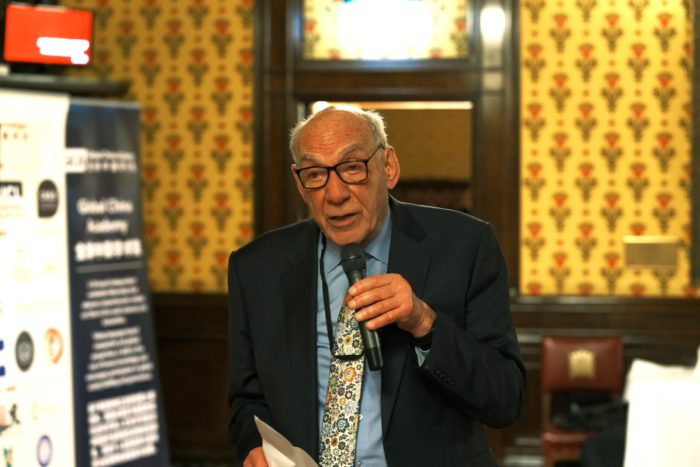
He emphasizes the academic community’s role in addressing global challenges such as wars, violence, and ecological imbalance. He praises historical contributions like Ancient Chinese wisdom and the European Enlightenment, while cautioning against past arrogance and imperialism. Advocating for ‘planetary universalism’ or a ‘New Enlightenment,’ Cohen calls for dialogue, pluralism, and tolerance, inspired by the ideas of reciprocity and transculturality that the GCA promotes. He concludes with a toast to the success of building a global society based on these principles.
Dr Frances Wood (吴芳思), a Trustee of the Global China Academy Board of Trustees and former Curator of Chinese Collections at the British Library, presented certificates to GCA Fellows and Associate Fellows.
GCA Fellows:
- Professor HOU Shiyuan (郝时远), Academician and former Associate President and former Director of the Institute of Ethnology and Anthropology at Chinese Academy of Social Sciences (Absent, in China).
- Professor Nora Ann Colton (诺拉·安·科尔顿), Director of the UCL Global Business School for Health (GBSH) (Absent, in Manila).
- Professor LI Linxue (李麟学), Dean of the College of Arts and Media at Tongji University, China
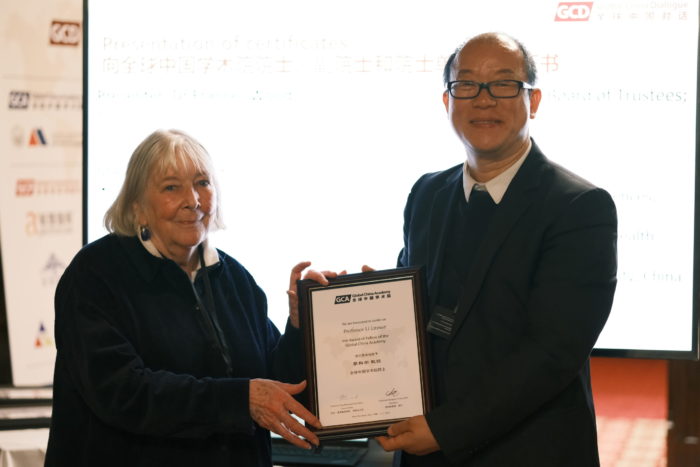
GCA Aassociate Fellows:
- Professor QIAN Yufang (钱毓芳), Director of Institute of Corpus and Discourse Studies, School of Foreign Studies, Zhejiang Gongshang University, China; Editor of the Journal of Corpus Approaches to Chinese Social Sciences
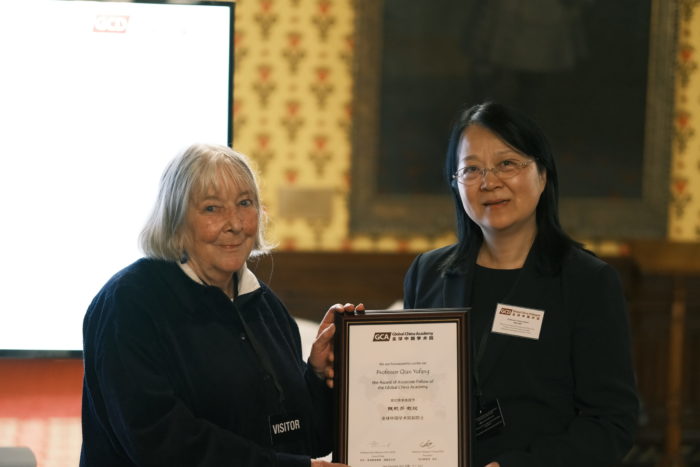
- Dr Gavin Brookes (加文·布鲁克斯), Reader in Linguistics and UKRI Future Leader Fellow with an interest in corpus linguistics, discourse analysis and health communication, Lancaster University, UK, Executive Editor of the Journal of Corpus Approaches to Chinese Social Sciences
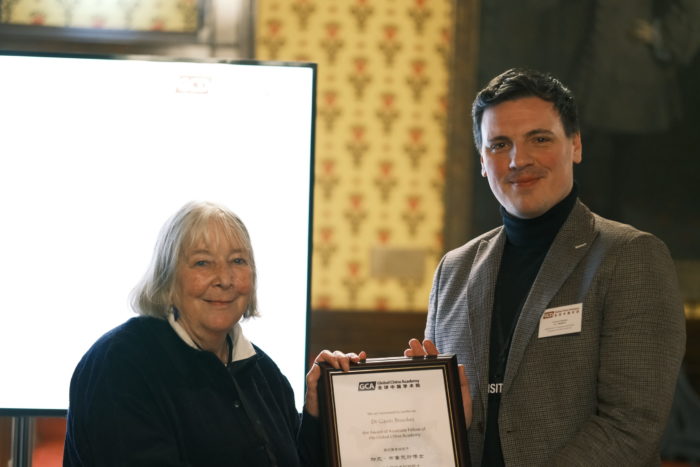
- Professor WANG Xin (王鑫), Head of Department of Communication, College of Arts and Media, Tongji University, China; Executive Editor of the Journal of China in Global and Comparative Perspectives (Chinese Edition, absent, in China)
Professor Xiangqun Chang (常向群) FRSA, FGCA, President of the Global China Academy, presented certificates to GCA Institutional Fellows:
- The UCL Global Business School for Health (GBSH)
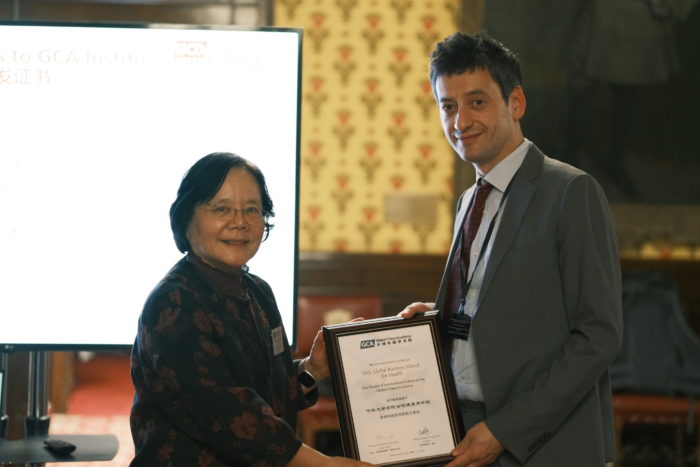
- The ESRC Centre for Corpus Approaches to Social Science at Lancaster University, UK
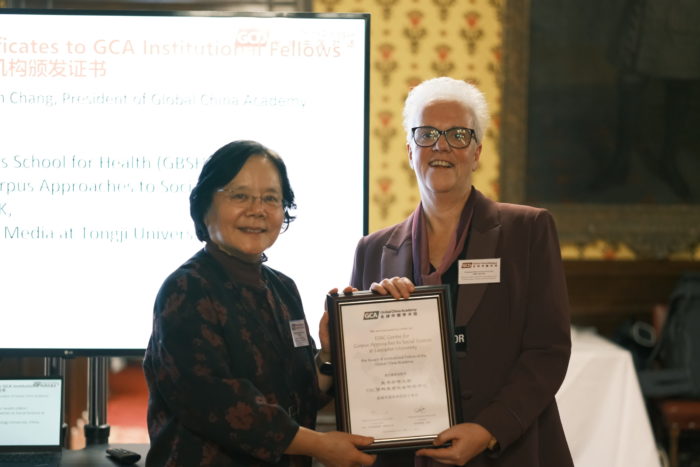
- The College of Arts and Media at Tongji University, China
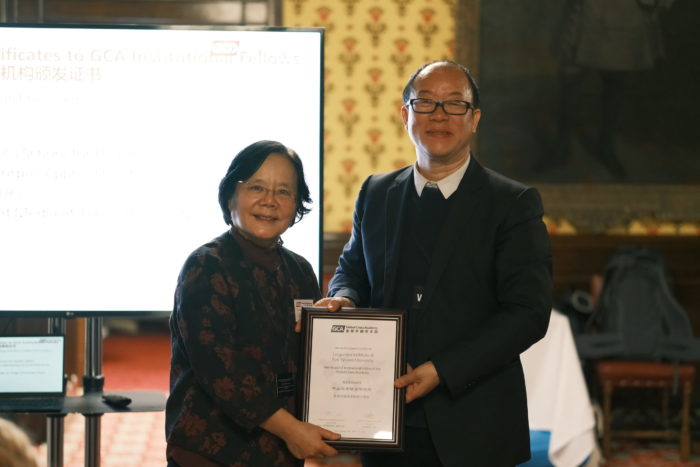
- The Institute of Linguistics, Sun Yat-sen University, China (absent, in China)
Afterwards, Professor Tony McEnery (托尼·麦肯内里), FAcSS, FRSA, FGCA and Chair of the Global China Academy Council and Council Member of the Academy of Social Sciences, as well as Distinguished Professor of English Language and Linguistics at Lancaster University, chaired the final session. This session featured the demonstration of greeting messages, and videos were played from some absent GCA Fellows.
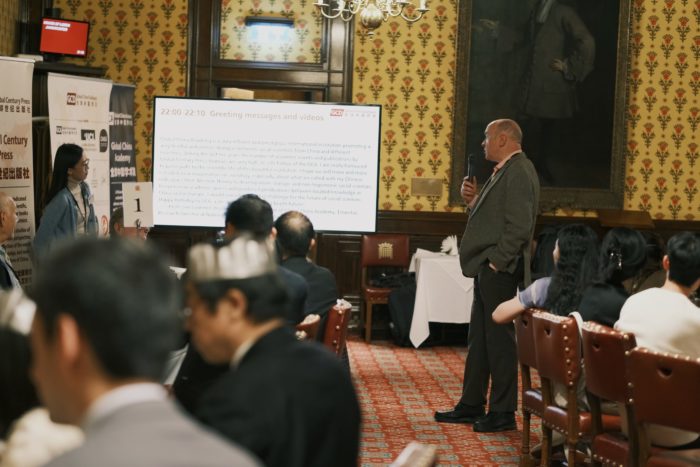
The messages are:
- Congratulations on the opening of the 8th Global China Dialogue. The Dialogue is most urgent at the current stage of world history. — Professor KOMAI Hiroshi(駒井 洋) FGCA, a Japanese sociologist and Professor Emeritus at the University of Tsukuba and Shigakukan University, Japan.
- The Global China Academy is a highly influential and prestigious international institution that promotes a very fruitful and intense dialogue between social scientists from China and various countries. Over the last ten years, the number of academic events, journals and other publications by Global Century Press has been very high. As a Life Fellow of the GCA, I am truly honoured to participate in the scientific life of this esteemed institution. I hope we will establish more and more cooperation in sociology, especially regarding what my Chinese colleagues and I call the Post-Western theory, to develop more dialogic and non-hegemonic social sciences. This aims to open new academic spaces and produce hybridizations between localized knowledge in China and Europe. It is a significant challenge for the future of social sciences. Happy Birthday to the GCA; wishing it great success and a very bright future! — Professor Laurence Roulleau-Berger (罗兰), FGCA, Emeritus Research Director at the National Centre for Scientific Research (NCSR).
The speakers and transcripts of video messages are:
- Professor XIE Lizhong (谢立中) FGCA and Chinese President of Global China Academy, Distinguished Chair Professor and former head of Department of Sociology of Peking University, China
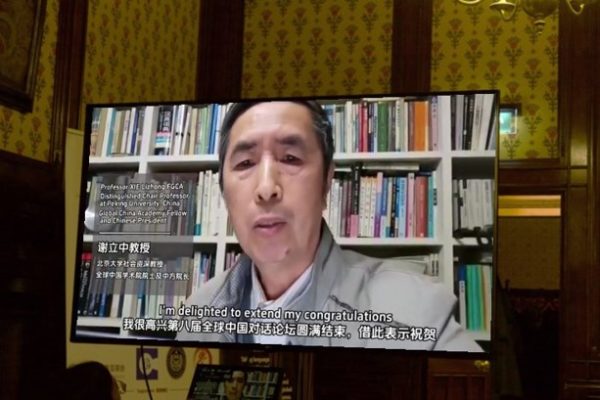
Good evening, everyone: I’m delighted to extend my congratulations on the successful conclusion of the 8th Global China Dialogue. This year also marks a significant milestone—the 10th anniversary of the Global China Academy’s establishment. Congratulations to all involved in this remarkable journey. Over the past decade, thanks to your concern, support, and active participation, the Global China Academy has successfully organized many activities. Additionally, Global Century Press has published a wide range of uncensored works on China, significantly contributing to the promotion of scholarly exchange in China studies worldwide. Looking ahead, I sincerely hope the Global China Academy will continue to receive your unwavering support, enabling it to grow and excel even further.
- Professor Carsten Herrmann-Pillath (何梦笔) FGCA and Vice President of Global China Academy, Permanent Fellow at the Max Weber Centre for Advanced Cultural and Social Studies, Erfurt University, Germany
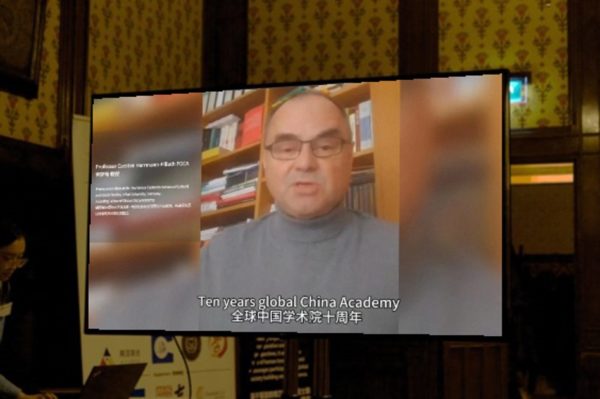
Ten years at Global China Academy, my heartfelt congratulations. What a decade: Trumpism, COVID-19, all these geopolitical tensions rising and creating an increasing distance between China and the so-called West. I think this is really a worrying trend, and an institution like the Global China Academy has a task to contribute to reversing this trend.
When I was a student, there was a China scholar who was famous, or I would say even infamous, for his neologism when dealing with China. One of his favorite neologisms was ‘impansionism.’ He argued that China was never, and will never be, a political power that pursues expansion in global terms like in the past, and some would say even today. Western countries define ‘impansionism’ as being just attractive to the world, just attracting people, capital, all that without doing anything. That’s deep, as you know, in the Taoist principle, the principle of non-action, Wu Wei. And I’m afraid that in the past decade, somehow, China also lost part of this wisdom.
I strongly believe, and that’s what I’ve experienced in my career of almost 40 years now dealing with China, that China is incredibly attractive and has always been incredibly attractive. That was also the topic in my video message last year. An institution like the Global China Academy can contribute exactly to this, making China attractive to the world. This does not mean to embellish China, but simply opening up, telling the truth, and also entering critical discourse. Actually, to a large degree, what is often called liberal values is the key to openness. And also, I think a key to non-action. China does not need to be afraid of any flies entering an open window. That’s what Mr. Weggel argued. It is true, about thousands of years of history of Chinese civilization. I wish Global China Academy the best for the next decade, that it will contribute to communicating Chinese thinking, Chinese debates, Chinese ideas to the world, and entering a multilateral intellectual dialogue. Thank you.
- Professor Shigeto Sonoda (園田 茂人) FGCA and Vice-President of Global China Academy, Professor of comparative sociology and Asian studies at the Institute for Advanced Studies on Asia, University of Tokyo, Japan
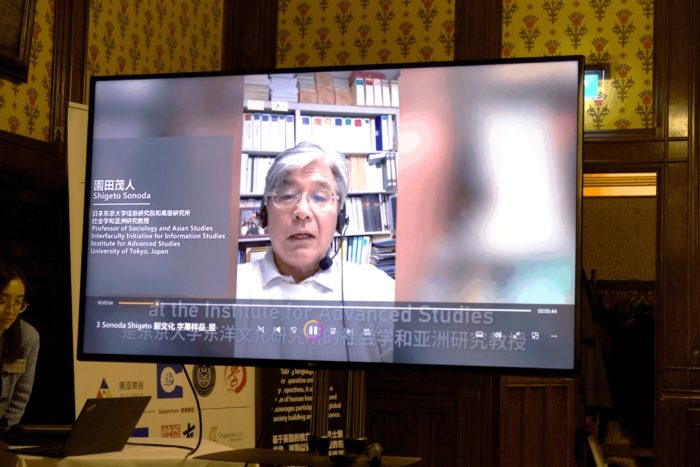
Hello, my name is Sonoda Shigeto, a Professor of Sociology and Asian Studies at the Institute for Advanced Studies on Asia at the University of Tokyo. Congratulations on the 10th anniversary of the Global China Academy. As you know, a variety of opinion polls reveal that people’s ideas and evaluations regarding the rise of China differ significantly from one country to another, even among Asian countries. Thus, I think it’s quite necessary for intellectuals to promote dialogue, especially intellectual dialogues between people in China and those in the global community. I hope that the Global China Academy will continue promoting these intellectual dialogues. Thank you.
- Professor Peter van der Veer (彼得·范德维尔) FGCA, Emeritus Professor and former Director of the Study of Religious Diversity at the Max Planck Institute, Germany.
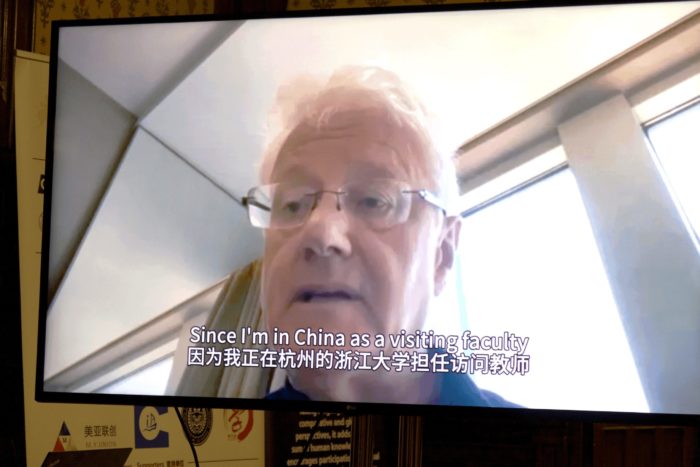
Dear colleagues at the Global China Academy, I’m terribly sorry I cannot be present at the event today, as I’m currently in China serving as a visiting faculty member at Zhejiang University in Hangzhou. I’m very pleased to be back in China. I have not been here for more than three years, and it’s really important to reestablish contacts after the Covid period, especially when academic exchange has become threatened. I believe that the Global China Academy can play an important role in this effort of reestablishing contact. I wish you much success.
- Professor Prasenjit Duara (杜赞奇) FGCA, Distinguished Professor of East Asian Studies, Duke University, USA
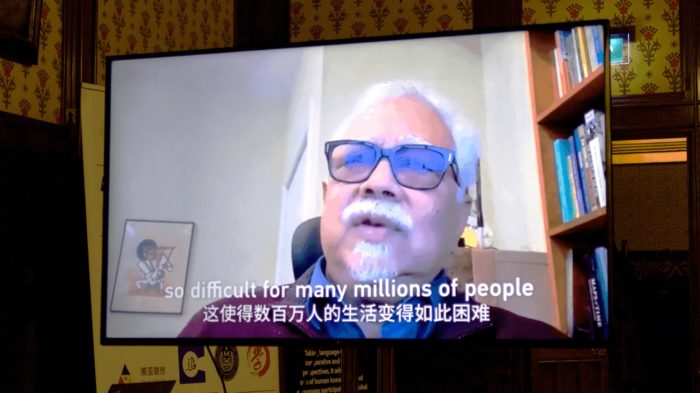
Good day, everybody. My name is Prasenjit Duara, and my Chinese name is DU Zanqi. I am the Oscar Tang Professor at Duke University. I was a student of China and global history. As a Fellow of the Global China Academy, I’m delighted to congratulate the Academy on conducting the 8th Global China Dialogue. In a period of increasing tensions around the world, which is making life so difficult for many millions of people, it is, I believe, imperative that as scholars, we maintain open dialogue in various areas of life between the major powers.
As someone originally from India, I also believe China and India should open more lines of dialogue and exchange. We need to create a global civil society that is invested in dialogue for peace. And now, have a productive conference and my best wishes to all of you. Goodbye now.
- Professor GU Yueguo (顾曰国) FGCA, Emeritus Research Professor of Linguistics in the Chinese Academy of Social Sciences (CASS), Former Pro-Vice-Chancellor, Beijing Foreign Studies University, China.
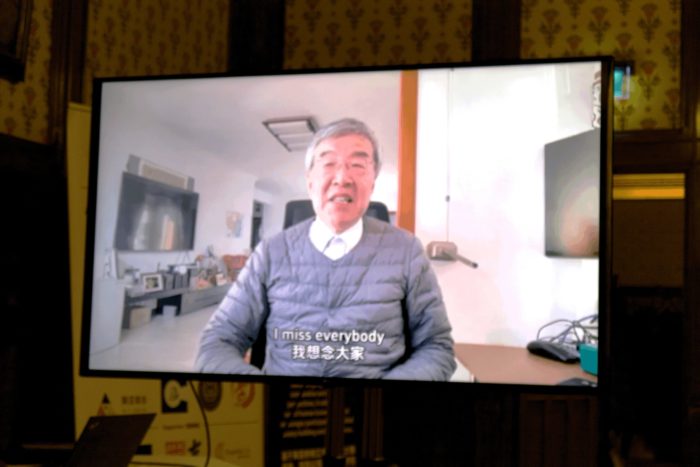
Hello there, I’m Gu Yueguo, an absent fellow greeting everybody from Beijing, PRC, because I have immersed myself in two national projects on gerontic discourse which I must complete. I miss everybody, and the 10th GCA anniversary dinner in particular. Have a good time in London.
- Professor HOU Shiyuan (郝时远) FGCA, Academician and former Associate President and former Director of the Institute of Ethnology and Anthropology at Chinese Academy of Social Sciences.
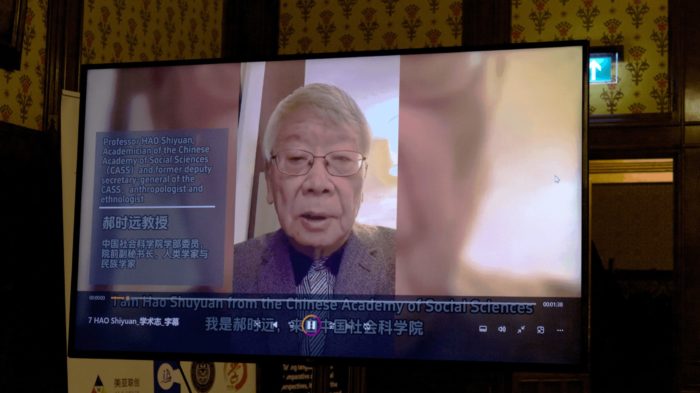
Hello to all the experts, I am Hao Shuyuan from the Chinese Academy of Social Sciences. First of all, I would like to express my heartfelt congratulations on the 10th anniversary of the Global China Academy’s series of important academic achievements. At the same time, I am also very pleased to have received academic honors. I would like to specially thank Professor Xiangqun Chang and the experts who recommended me to join the academic team of the Global China Academy. Here, I can only simply express a wish and convey my own desire. That is to say, receiving academic honours is in fact also taking on an academic responsibility.
In the future, I am willing to engage in academic exchanges and cooperation with all my colleagues at the Global China Academy and jointly make our own efforts to fulfill this academic responsibility. Thank you all.
- Professor BING Zheng 邴正教授 FGCA, former Executive Vice-President of Jilin University; former Vice-President of the Chinese Sociological Association, China.
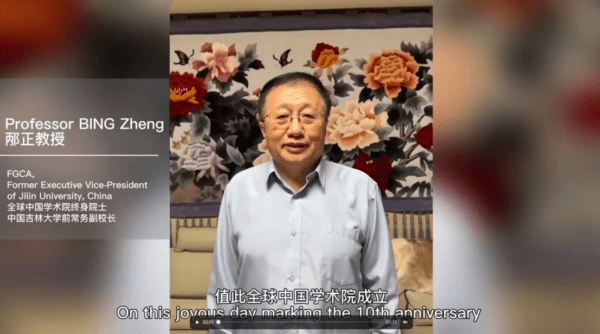
On this joyous occasion of the 10th anniversary of the establishment of the Global China Academy, I would like to express my heartfelt thanks and sincere congratulations to the Global China Academy and Professor Chang Xiangqun.
Since its establishment, the Global China Academy has actively organized scholars from China and the UK, strengthening academic and cultural exchanges and promoting academic communication and publication activities. It has played a very important role in organizing academic events and connecting scholars, building a bridge between Chinese and British scholars. Through this bridge, many Chinese and British scholars have enhanced their understanding, exchanged academic ideas, tightened their connections, and fostered friendships through mutual exchanges and visits.
Therefore, I wholeheartedly wish the Global China Academy to attract more talented individuals, gather more academic strength, jointly promote Sino-British friendship, and advance academic research around globalization, leading to more academic exchanges and scholarly achievements.
- Click here to visit the 10th GCA Dinner session Part I – Presenting cirtificates to new Fellows
- Click here to visit the 10th GCA Dinner session Part II – Playing multimedia messages from absent fellows and speakers.
- Click here to visit the 10th GCA Reception session – Launch GCA and GCP two new websites.
- Click here to visit the 8th GCD webpage.
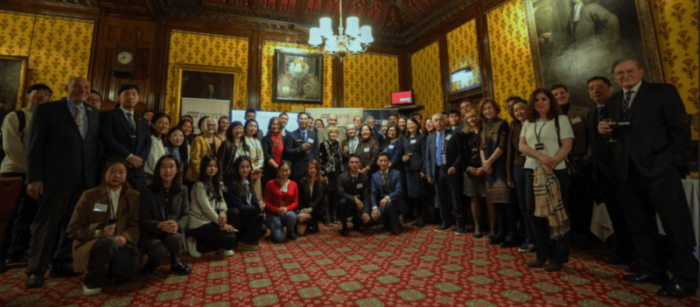
Global China Academy Celebrates a Decade of Excellence and Intellectual Exchange
The Global China Academy (GCA) proudly celebrated its 10th anniversary in conjunction with the conclusion of the 8th Global China Dialogue. This significant milestone was marked by a series of events held at prestigious venues, including the British Academy and UK Parliament, on December 8, 2023.
This year’s celebration was not just a reflection on the past decade’s achievements but also a forward-looking gathering that set the stage for future intellectual exchange and collaboration. The event brought together scholars, experts, and thought leaders from around the world, facilitating insightful discussions on global health governance and related themes.
Highlights of the Anniversary Celebrations:
- The evening commenced with a reception celebrating the launch of new websites for the Global China Academy and Global Century Press. This digital expansion represents GCA’s commitment to accessible and global knowledge dissemination.
- The dinner was a blend of celebration, recognition, and intellectual discourse. Notable speeches were delivered by key figures, including Professor Martin Albrow, Professor Tony McEnery and Professor Robin Cohen, reflecting on GCA’s journey and its pivotal role in fostering global dialogue and building global society.
- The event also recognized the contributions of various scholars to the field of China studies and global exchange. Certificates were awarded to GCA Fellows, Associate Fellows institutional Fellows, acknowledging their significant academic achievements and contributions.
- The celebration included virtual contributions from GCA Fellows and speakers who couldn’t attend in person, highlighting the Academy’s widespread influence and connections.
Over the past decade, the Global China Academy has established itself as a leading institution in promoting scholarly research and dialogue on China and its global interactions. Its conferences, publications, and academic collaborations have significantly contributed to the understanding of China’s role in the world.
As the Academy steps into its second decade, it continues to uphold its mission of fostering intellectual exchanges, promoting diverse perspectives, and contributing to global understanding and cooperation.
The ‘Photo Report’ below contains about 1,500 words and 70 photos, and includes links for viewing or downloading related speech notes and greeting texts or video transcriptions.
Photo report: Reception and Dinner to Celebrate the Conclusion of GCD8 and the GCA’s 10th Anniversary, 19:00-22:30, 8 December 2023 at the House of Lords, the UK Parliament
Reception: 19:00-19:30 Drinks and networking
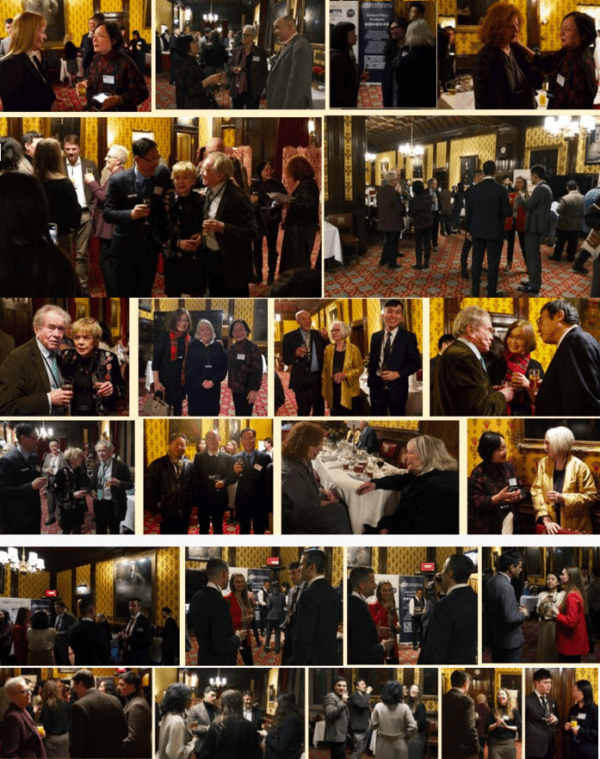
Reception: 19:30-19:50 Launch of two new websites for GCA and GCP
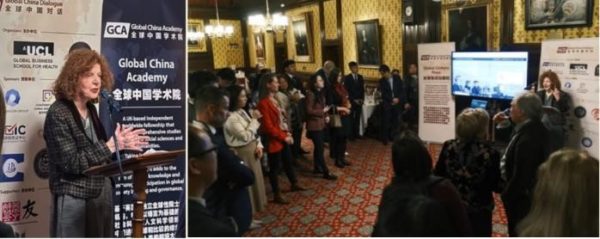
Chair: Professor Maria Jaschok 叶玛丽教授, Life Fellow of Global China Academy, Senior Research Associate of the Contemporary China Studies Programme in the Oxford School of Global and Area Studies, University of Oxford

Brief introduction to the two websites, by Professor Xiangqun Chang 常向群教授 FRSA FGCA and President of Global China Academy; Honorary Professor of University College London (2015-20); Distinguished Professor of Nankai University of China
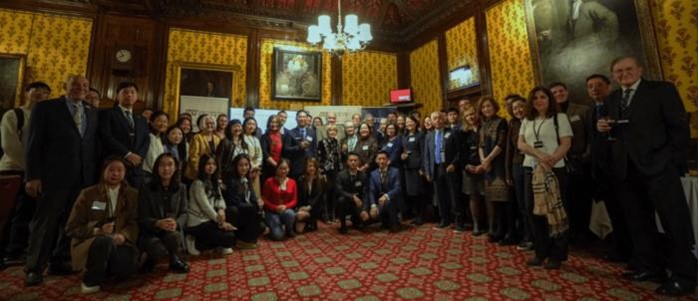
Participants at the launch of the new websites
Dinner: celebrating the conclusion of the 8th Global China Dialogue and the 10th Anniversary of Global China Academy
Dinner: 20:10-20:25 (after starter) Speeches

Chair: Professor Elena Semino 埃琳娜·塞米诺教授 FAcSS FRSA, GCD Organizing Committee member, Director of the ESRC Centre for Corpus Approaches to Social Science, Lancaster University (left in photo)

Speakers:
- Professor Martin Albrow 马丁阿尔布劳教授, FAcSS, Founding and Past Honorary President of Global China Academy; Former President of the British Sociological Association (left in photo). Click to download speech notes in dual languages.
- Professor Tony McEnery 托尼麦肯尼教授, FAcSS FRSA FGCA and Chair of Global China Academy Council, Council Member of the Academy of Social Sciences, Distinguished Professor of English Language and Linguistics at Lancaster University (second left in photo). Click to download speech notes in dual languages.
- Dr QIAN Zhenhua 钱振华博士, Co-Chair of Global China Academy Council; Shanghai International Corporation Association of SMEs, China (second right in photo). Click to download speech notes in dual languages.
- Professor Robin Cohen 罗宾科恩教授, Life Fellow of Global China Academy; Emeritus Professor and Former Director of the International Migration Institute, University of Oxford (right in photo). Click to download speech notes in dual languages.
Dinner: 21:15-21:25 (after main course) Presentation of certificates
Chair: Presentation of certificates, Professor Tony McEnery 托尼·麦肯尼教授 (right in photo)
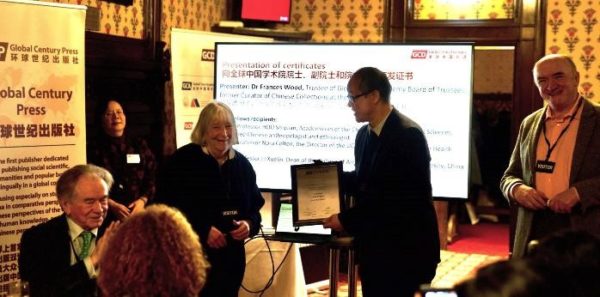
Presentation of certificates to GCA Individual Fellows
Presenter: Dr Frances Wood 吴芳思博士, Trustee of Global China Academy; former Curator of Chinese Collections at the British Library

GCA Fellows 院士 Recipients:
- Professor HOU Shiyuan 郝时远教授, Academician and former Associate President and former Director of the Institute of Ethnology and Anthropology at Chinese Academy of Social Sciences (absent, in China)
- Professor Nora Ann Colton 诺拉科尔顿教授, Director of the UCL Global Business School for Health (GBSH) (absent, in Manila)
- Professor LI Linxue 李麟学教授, Dean of the College of Arts and Media at Tongji University, China (left)
GCA Associate Fellows 准院士 Recipients:
- Professor QIAN Yufang 钱毓芳教授, Director of Institute of Corpus and Discourse Studies, School of Foreign Studies, Zhejiang Gongshang University, China; Editor of the Journal of Corpus Approaches to Chinese Social Sciences (centre)
- Dr Gavin Brookes 加文布鲁克斯博士, Reader in Linguistics and UKRI Future Leader Fellow with an interest in corpus linguistics, discourse analysis and health communication, Lancaster University, UK, Executive Editor of the Journal of Corpus Approaches to Chinese Social Sciences (right)
- Professor WANG Xin 王鑫教授, Head of Department of Communication, College of Arts and Media, Director of Research Centre for Chinese Discourse and Global Communication at Tongji University (absent, in China)
Presentation of certificates to GCA Institutional Fellows
Presenter: Professor Xiangqun Chang 常向群教授

GCA Institutional Fellows Recipients 院士单位:
- The UCL Global Business School for Health (GBSH), UK. Recipient: Professor Simcha Jong 辛查钟教授, GBSH representative (left)
- The ESRC Centre for Corpus Approaches to Social Science at Lancaster University, UK. Recipient: Professor Elena Semino 埃琳娜塞米诺教授, CASS representative (centre)
- The College of Arts and Media (CAM) at Tongji University, China. Recipient: Professor LI Linxue 李麟学教授, CAM representative (right)
Presentation of certificate to GCA Council member:
Presenter: Professor Tony McEnery 托尼·麦肯尼教授, Chair of Global China Academy Council

Recipient: Dr QIAN Zhenhua 钱振华博士, Co-Chair of Global China Academy Council
Dinner: 21:15-21:25 (after dessert) Greeting messages and videos
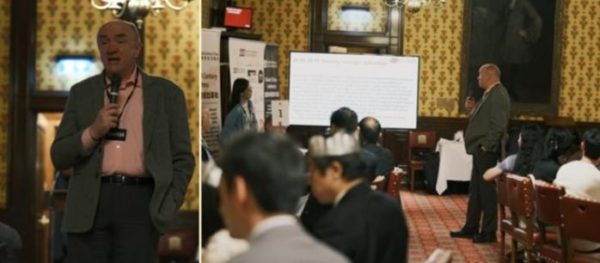
Chair: Professor Tony McEnery 托尼·麦肯尼教授, reading greeting messages and watching videos from absent GCA Fellows and GCD8 speakers (left)
Greeting messages were received from Professor KOMAI Hiroshi 駒井 洋教授 FGCA, a Japanese sociologist and Professor Emeritus at the University of Tsukuba and Shigakukan University, Japan; Professor Laurence Roulleau-Berger 罗兰教授, Life Fellow of Global China Academy, Emeritus Research Director at National Centre for Scientific Research (NCSR).
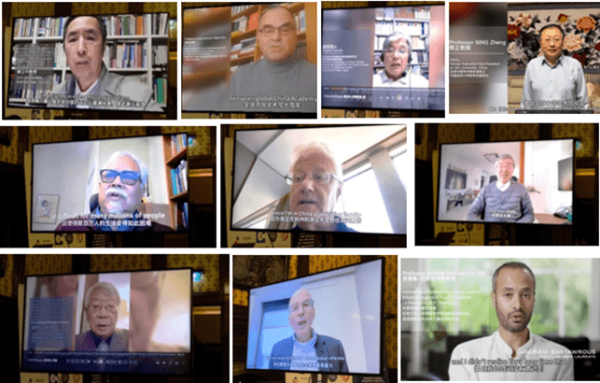
Videos with English and Chinese dual language subtitles:
Videos from absent GCA Fellows: Professor XIE Lizhong 谢立中教授, Founding Fellow and Chinese President of Global China Academy, Distinguished Chair Professor and former head of Department of Sociology of Peking University, China (top left); Professor Carsten Herrmann-Pillath 何梦笔教授, Founding Fellow and Vice-President of Global China Academy (European engagement), Permanent Fellow at the Max Weber Centre for Advanced Cultural and Social Studies, Erfurt University, Germany (top second left); Professor Shigeto Sonoda 園田茂人教授, Founding Fellow and Vice-President of Global China Academy (Asian engagement), Professor of Comparative Sociology and Asian Studies at the Institute for Advanced Studies on Asia, University of Tokyo, Japan (top second right); Professor BING Zheng 邴正教授, Life Fellow of Global China Academy, former Executive Vice-President of Jilin University, former Vice-President of the Chinese Sociological Association, China (top right); Professor Prasenjit Duara 杜赞奇教授, Life Fellow of Global China Academy, Distinguished Professor of East Asian Studies, Duke University, USA (centre left); Professor Peter van der Veer 彼得·范德维尔教授, Life Fellow of Global China Academy, Emeritus Professor and former Director of the Study of Religious Diversity at the Max Planck Institute, Germany (centre second left); Professor GU Yueguo 顾曰国教授, Life Fellow of Global China Academy, Emeritus Research Professor of Linguistics in the Chinese Academy of Social Sciences (CASS), Former Pro-Vice-Chancellor, Beijing Foreign Studies University, China (centre right); Professor HOU Shiyuan 郝时远教授, Fellow of Global China Academy (2023), Academician and former Associate President and former Director of the Institute of Ethnology and Anthropology at Chinese Academy of Social Sciences (bottom left)
Videos from absent invited speakers:
Professor Lawrence Gostin 劳伦斯·戈斯汀教授, Founding O’Neill Chair in Global Health Law, Georgetown University
Professor Andrew Bastawrous 安德鲁·巴斯塔罗斯教授 OBE, International Centre for Eye Health, London School of Hygiene & Tropical Medicine, Co-Founder & CEO – Peek Vision
Click here to view all the above texts or transcriptions.
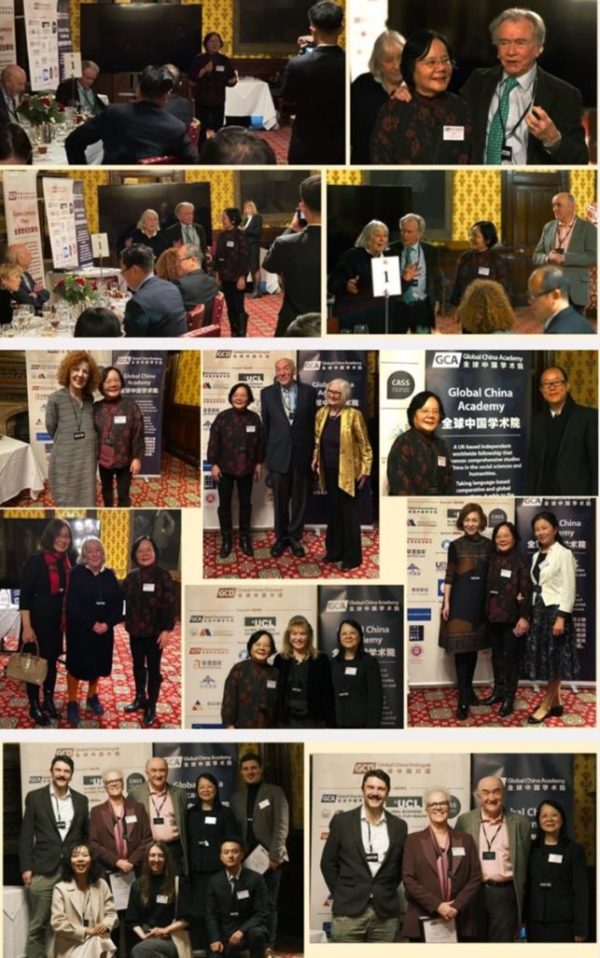
Afterwards, Professor Martin Albrow and Dr Frances Wood expressed their heartfelt appreciation to Professor Xiangqun Chang for her dedication and hard work in ensuring the success of the 8th Global China Dialogue and the 10th Anniversary of the Global China Academy. As the event came to a close, participants gathered in groups, exchanging warm greetings and farewells and taking photos to capture the occasion.
The Global China Dialogue Organising Committee is pleased to share feedback from a participant, which underscores the impactful nature of our events and the wide-reaching benefits they offer to attendees from diverse professional backgrounds.
‘I wish to send my most heartfelt thanks to Professor Chang for the wonderful and most successful event yesterday. Although my expertise is in family law and not the health sector, I feel I have benefited so much by attending the event, listening to all the talks and the research and insight from the various speakers. They were all fantastic and their hard work behind the research is outstanding and so much appreciated.
I especially would like to thank Professor Chang for inviting my friend Qing Miao and me to the dinner at the House of Lords. It was not planned by us, but we were both delighted and felt privileged to have been there. The presentation of the certificates and the various speakers sending their messages and greetings from the UK and abroad were extremely moving and uplifting. It was a real encouragement that the good work which has been started must continue and the gain will in time benefit us all.
I wish the GCA every success in all you do and once again thank you so much for the opportunity to be included in the attendance yesterday.’ — Brenda Wong Robinson, Associate at Buckles Solicitors LLP
More information is available on the GCD8 website: https://globalchinaacademy.org/global-china-dialogue-8.
- Click here to visit Photo Highlights: Global China Dialogue VIII (2023), New Website Launches for Global China Academy and Global Century Press, and 10th Anniversary of Global China Academy
- Click here to visit Photo highlights: Reception including Drinks and Networking, and Launch of Two New Websites for Global China Academy and Global Century Press.
- Click here to visit Photo Highlights: Dinner to Celebrate the Conclusion of the 8th Global China Dialogue and the 10th Anniversary of the Global China Academy (Part I), Including Speeches, Presentation of Certificates.
- Clich here to visit Photo Highlights: Dinner to Celebrate the Conclusion of the 8th Global China Dialogue and the 10th Anniversary of the Global China Academy (Part II) Including Reading Messages and Playimng Video Greetings, and Videos from Absent Speakers of GCD8.
- Click here to visit the GCD 8 website for more.
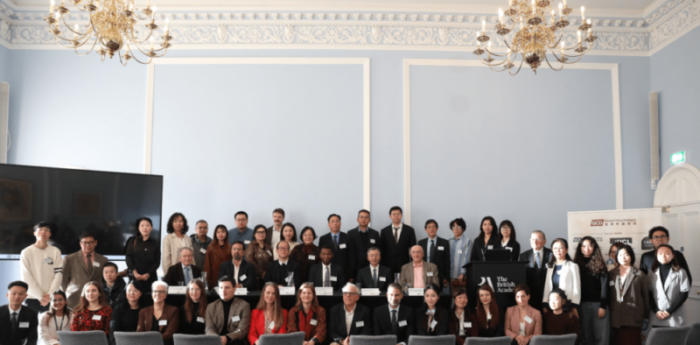
Exciting Updates from the 8th Global China Dialogue
The COVID-19 pandemic of 2020 revealed many weaknesses in our healthcare systems and structures across the world and showed that health is a challenge that requires global governance and cooperation. Other issues such as climate change, the global prevalence of noncommunicable diseases, inadequate access to healthcare services and the lack of health workers globally also show that the need for global cooperation to deal with transnational challenges has never been greater.
The 8th Global China Dialogue explored the challenges and opportunities for global health governance, especially in the Chinese context, given China’s ageing population, continued economic growth and desire to reimagine healthcare management and governance. The Healthy China 2030 strategy emphasizes the need to develop the health sector in China. China has also instituted significant regulatory reforms in the health sector, while considering healthcare in the new global governance framework.
The GCD8 was co-organized by the Global China Academy in collaboration with the UCL Global Business School for Health, the ESRC Centre for Corpus Approaches to Social Science at Lancaster University, UK, and the College of Arts and Media at Tongji University, China. It received support and sponsorship from numerous universities, institutions and companies.
The GCD8 and associated events, held on December 8, 2023, at the prestigious British Academy and UK Parliament, brought together scholars and experts from the UK, China, and France for an enlightening hybrid offline and online conference. Delving into the complexities of global health governance, the dialogue consisted of four insightful panels:
- Global Health and System Integration
- The Challenges of Global Health Governance
- Communicating to Improve Global Health
- Health Governance in the Digital Space
The ‘Photo Report’ below contains about 2,100 words and 130 photos, and includes links for viewing or downloading almost all the speech notes or PowerPoint presentations from the GCD8.
Photo report: The 8th Global China Dialogue — Governance for Global Health and the Global China Academy’s 10th Anniversary
Friday, 08:30-17:00, 8 December 2023 at the British Academy, followed by a Celebration Reception and Dinner at the House of Lords
Opening session
Greetings from political and academic figures
Chair: Professor Tony McEnery 托尼·麦肯尼教授 FAcSS FRSA FGCA and Chair of Global China Academy Council, Distinguished Professor of English Language and Linguistics at Lancaster University; Council Member, Academy of Social Sciences (right in panel)

Speakers (from left to right):

- Minister Wang Qi 王起of the Chinese Embassy to the UK said that the COVID-19 pandemic has had a significant impact on global public health and socio-economic development. Only by joining hands to build a global community of health for all can we effectively maintain and promote the safety and sustainable development of human life and health.
- Professor Ibrahim Abubakar 易卜拉欣阿布巴卡尔, Pro-Provost (Health) and Dean of Faculty of Population Health Sciences at UCL, emphasized the importance of interdisciplinary collaboration in addressing major global health challenges, such as the climate crisis, infectious diseases and health inequalities. He underscored the necessity of collaborative efforts, data-driven policies and equitable access to healthcare to improve health outcomes worldwide.
- Professor LI Linxue 李麟学, Dean of the College of Arts and Media and Distinguished Professor of the School of Architecture and Urban Planning at Tongji University, stated that the health sector is increasingly becoming a focal point of attention for the entire society. In the fields of urban planning and urban environmental design, healthy cities, communities and architecture, there is vast potential for development in emerging technologies such as big data, intelligence, simulation and green low-carbon construction.
- Professor Martin Albrow 马丁阿尔布劳, the Founding and Past Honorary President of the Global China Academy, provided some insights into the GCA’s history and announced the 10th anniversary of the Global China Academy, including a reception and celebration dinner.
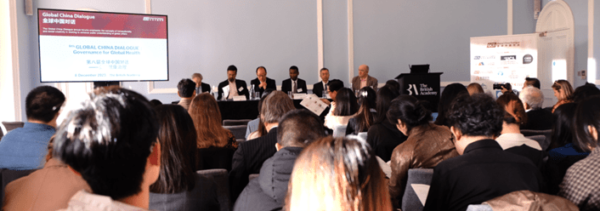
The photos below illustrate keynote speeches, panel discussions and closing remarks at the Global China Dialogue, as well as the Reception and Dinner. Additionally, there are images from the Q&A sessions and networking opportunities during breaks. It is hoped that this combination of images and text will promote dynamic dialogue for interested readers, regardless of whether or not they participated in GCD8.
Keynotes speeches
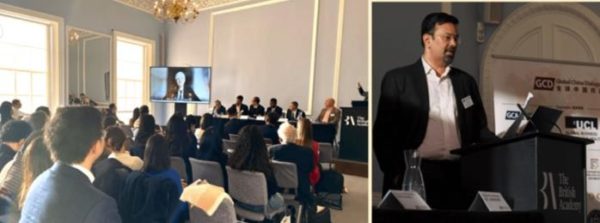
‘Global Governance and Health: Navigating the Complex Landscape’. Professor Nora Colton 诺拉·科尔顿教授视频, Director of UCL Global Business School for Health [online greeting]. Her presentation was delivered by Professor Colton’s colleague Professor Kabir Sheikh卡比尔·谢赫教授代读, UCL GBSH). Click to download the following items: greetings, speech notes and PowerPoint presentation.
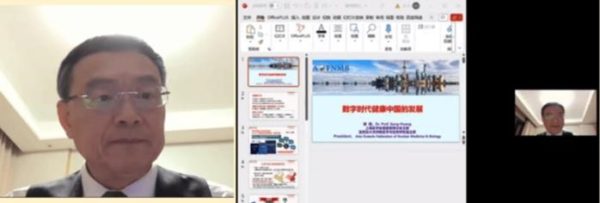
‘The Development of Healthy China in the Digital Era’, Professor HUANG Gang 黄钢教授, Founding President of Shanghai Health Medical College, Distinguished Chair Professor of Medical School of Shanghai Jiao Tong University, China [online]. Click to download the PowerPoint presentation in English and Chinese.

Group photo at the end of the Opening session.
Panel I: Global Health and System Integration
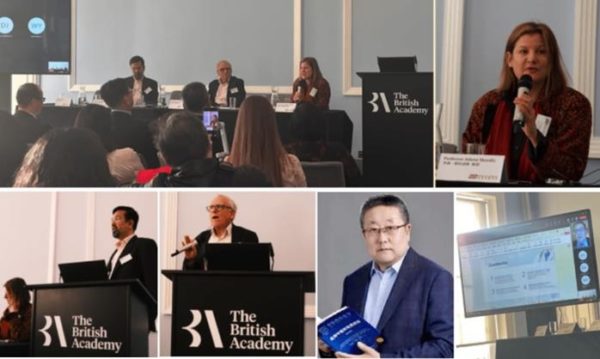
Chair: Professor Jolene Skordis 乔琳·斯科迪斯教授, Institute of Global Health, University College London
Plenary speakers (from left to right):
- ‘Mixed Health Systems in Asia and the Challenge of Governance’, Professor Kabir Sheikh 卡比尔谢赫教授, Global Business School for Health, former Policy Adviser for the World Health Organization (WHO). Click to download the PowerPoint presentation.
- ‘Interconnectedness and Competition in the Global Health System’, Professor Gerry Bloom 格里布鲁姆教授, Research Fellow and Co-Convenor of the Health and Nutrition Research Cluster, Institute of Development Studies, University of Sussex. Click to download the speech notes and PowerPoint presentation.
- ‘Integration and Innovation: The Logic and Practice of China’s Active Health Strategy in the Era of Population Ageing’, Professor HOU Shengtian 侯胜田教授, Professor of School of Management, Beijing University of Chinese Medicine; Director of the Health Industry Research Centre of the National Institute of Chinese Medicine Development and Strategy, China [online]. Click to download the PowerPoint presentation (in Chinese and English).
- ‘Integration and Cooperation: The Empirical Solution of Global Health Development’, Dr Peter Jeng 郑荣昌博士, CEO and Founder of China Britain Healthcare Consulting, UK; Deputy Secretary General of EU–China Commission, Belgium [online]. Click to download the PowerPoint presentation.
Panel II: The Challenges of Global Health Governance
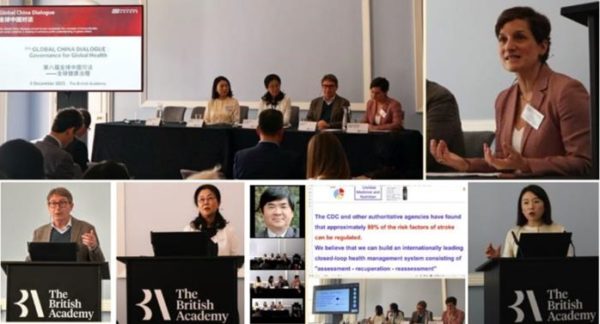
Chair: Ms Suzanne Wait 苏珊娜·维特女士, Managing Director of Health Policy Partnership and a Health Executive in Residence at GBSH, UCL
Plenary speakers (from left to right):
- ‘Building the Tools of Global Health Governance: The Case of Coronavirus’, Dr Joël Ruet 周瑞博士 , CNRS researcher at i3, Ecole Polytechnique; Senior Adviser Technology for Change and President of The Bridge Tank (G20 Think Tank Member), France
- ‘The Problems Faced by Medical Aesthetics: Challenges in Global Health Governance’, Dr LIAO Nong 廖农医师, Chief Physician of the Department of Plastic and Cosmetic Surgery at the Third Affiliated Hospital of Guangzhou Medical University, China. Click to download the PowerPoint presentation.
- ‘Challenge from an Ageing Society: The Urgency and Strategy of China’s Health Industry Development’, Professor YIN Weihai 殷卫海教授, Professor and Deputy Dean of the School of Biomedical Engineering at Shanghai Jiao Tong University, China [online] Click to download the PowerPoint presentation in English and Chinese.
- ‘Utilising Multi-disciplinary Research to Promote Global Health System Preparedness: Early Evidence from China’, Dr Yuxi Zhang 张予曦博士, Assistant Professor in Health Policy and Systems, Global Business School for Health, University College London, UK. Click to download the PowerPoint presentation.
Panel III: Communicating to Improve Global Health
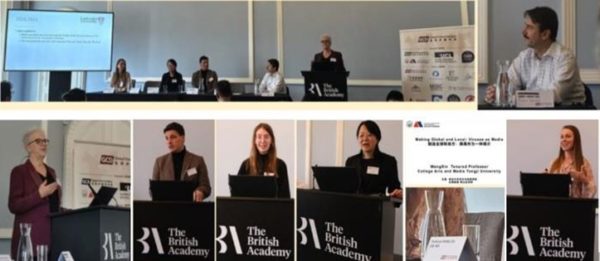
Chair: Professor Paul Baker 保罗·贝克教授, Department of Linguistics and English Language, Lancaster University
Plenary speakers (from left to right)
- ‘Understanding and Addressing Vaccine Hesitancy’, Professor Elena Semino 埃琳娜塞米诺教授 FAcSS FRSA, Director of the ESRC Centre for Corpus Approaches to Social Science, Lancaster University, UK. Click to download the PowerPoint presentation.
- ‘Public Communication about Dementia: Identifying and Challenging Stigma’, Dr Gavin Brookes 加文布鲁克斯博士, Reader in Linguistics and UKRI Future Leader Fellow with an interest in corpus linguistics, discourse analysis and health communication, Lancaster University; and Dr Emma Putland 艾玛·普特兰博士, Senior Research Associate, Lancaster University, UK. Click to download the PowerPoint presentation.
- ‘Evolution of Traditional Chinese Medicine Discourse in British Newspapers: A Corpus-Based Diachronic Study’, Professor QIAN Yufang 钱毓芳教授, Director of Institute of Corpus and Discourse Studies, School of Foreign Studies, Zhejiang Gongshang University, China. Click to download the PowerPoint presentation.
- ‘Making Global and Local: Viruses as a Media’, Professor WANG Xin 王鑫教授, Head of Department of Communication, College of Arts and Media, Tongji University, China [online]. Click to download the PowerPoint presentation.
- ‘Supporting Health Engagement and Co-creation’, Dr Marzena Nieroda 马泽纳涅罗达博士, Lecturer in Marketing and Commercialization for Healthcare at UCL Global Business School for Health (GBSH), University College London, UK. Click to download the PowerPoint presentation.
Panel IV: Health Governance in the Digital Space
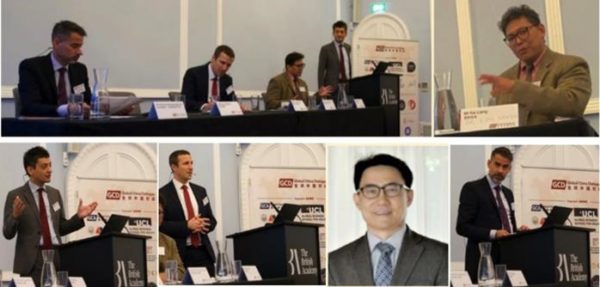
Chair: Dr Kim Yahya 金·叶海亚博士, a biomedical scientist who has worked in a variety of settings from academia to biotech companies in the UK
Plenary speakers (from left to right)
- ‘Capitalising on the Health Data Gold Mine: Using Federated Learning to Engage China in the Global Health Data Space’, Professor Simcha Jong 辛查钟教授, Professor of Management and Healthcare Innovation, Director DBA Health programme, UCL Global Business School for Health, UK. Click to download the PowerPoint presentation.
- ‘The Evolution of Health Governance in the Digital Health Space’, Professor Adam Dubis 亚当杜比斯教授, Deputy Director of Research and Programme Lead for MSc Digital Health and Entrepreneurship at UCL’s Global Business School for Health, University College London, UK. Click to download the PowerPoint presentation.
- ‘Hainan Free Trade Port: Challenges and Opportunities for Health’, by Professor NING Yi 宁毅教授, Professor and Dean of School of Public Health, Hainan Medical University, China [online]. Click to download the PowerPoint presentation.
- ‘A New Culture of Governance for an Inclusive Digital Future’, Dr Dimitrios Kalogeropoulos 迪米特里奥斯卡洛格罗普洛斯博士, Health Executive in Residence at GBSH, UCL, and CEO of Global Health and Digital Innovation Foundation, UK. Click to download the speech notes and PowerPoint presentation.
Closing session

Chair: Professor Xiangqun Chang 常向群教授, FRSA FGCA and President of Global China Academy; Honorary Professor of University College London (2015-20); Distinguished Professor of Nankai University of China; UK (right)

Closing remarks:
- ‘An Off-the-Cuff Summary of the Dialogue’s Main Themes’, Professor Tony McEnery 托尼麦肯尼教授, FAcSS FRSA FGCA and Chair of Global China Academy Council; Council Member of Academy of Social Sciences; Distinguished Professor of English Language and Linguistics at Lancaster University. He highlighted the interdisciplinary and engaging discussions that had occurred throughout the day, touching on various aspects of health, governance, trust and the role of traditional and modern medicine. The Dialogue emphasized the importance of listening, valuing diverse perspectives and the enriching nature of such exchanges. It also hinted at future discussions on AI and ethics, emphasizing the critical intersection of healthcare, decision-making and ethical considerations in the deployment of AI technologies. The day was summarized as insightful, stimulating a broadened perspective on health and governance, underscored by the foundational role of trust in scientific and medical expertise.
- ‘Upholding the Spirit of Open Cooperation, Building a Healthy Global Society for Mankind’, Mr FAN Daqi 范大祺副院长, Deputy Director and Chief Translator/Editor of the Academy of Contemporary China and World (ACCWS), China [pre-recorded video]. Fan Daqi’s closing speech was delivered in Chinese. He focused on the imperative of open cooperation and building a global health community. He discussed the impact of the pandemic, the importance of addressing global health governance and the need for dialogue and cooperation beyond geographical and systemic differences. Fan emphasized the role of think tanks, universities and research institutions in knowledge sharing and collaborative research to enhance global health governance. He advocated for a common health community, emphasizing sovereign equality, equity and the consideration of vulnerable groups’ rights and well-being. Fan also highlighted China’s contributions to global health governance and called for increased international cooperation to build a community with a shared future for mankind. Click to download the speech notes in Chinese and English.
Q & A sessions
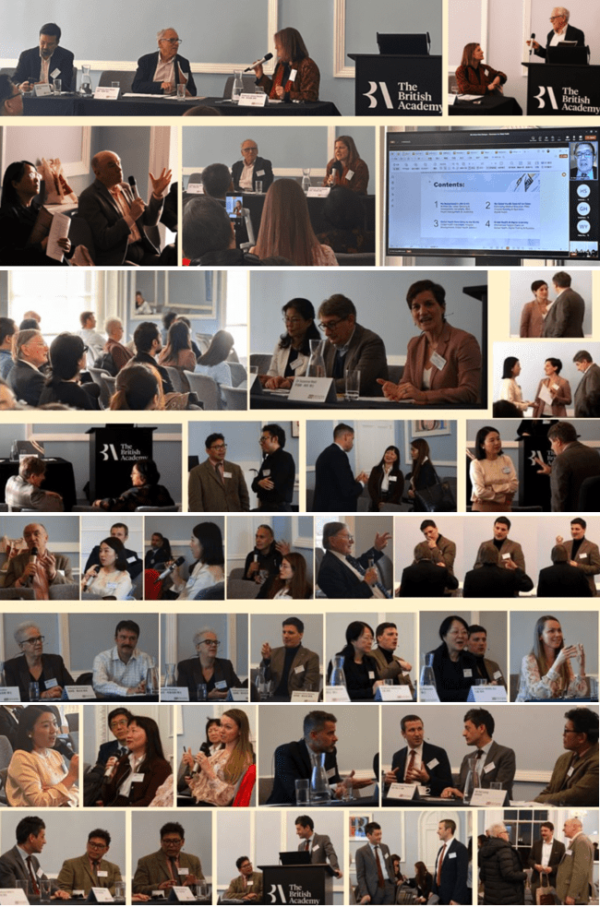
Networking during registration, tea/coffee breaks and lunch
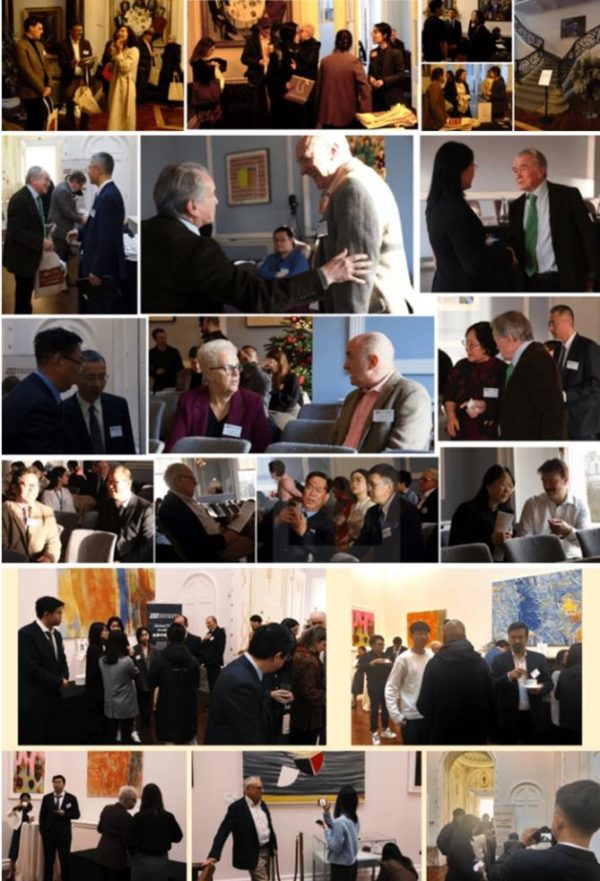
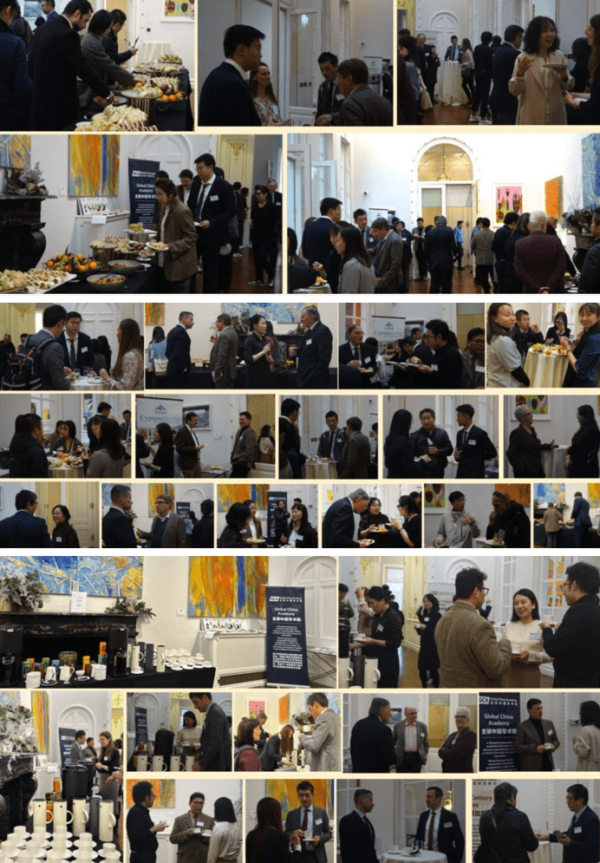
That evening, a Reception and Dinner were hosted at the House of Lords in the UK Parliament. Click here to view and download the related speech notes.
We have a large collection of photos from the 8th Global China Dialogue (GCD 8), and we’ve selected essential shots for publication on our photo report webpage. We encourage readers to explore the site to view many more photos that capture the essence of the event. This photo review showcases participants and highlights from the opening session, panel discussions, and networking breaks. It also includes the reception that marked the launch of new websites for the Global China Academy and the Global Century Press. Additionally, featured is the dinner celebrating the conclusion of the 8th Global China Dialogue and the 10th anniversary of the Global China Academy.
We are excited to share the profound insights and discussions presented by our esteemed speakers. Their expertise and contributions made this dialogue a landmark event in advancing the discourse on global health governance.
We extend our heartfelt thanks to all the organisers, supporters, sponsors, chairs, speakers, participants and volunteers who made this event a grand success. Your active engagement and insightful contributions are invaluable to the ongoing conversation on global health.
Don’t miss out on the enriching content from the 8th Global China Dialogue. Visit the GCD 8 website now to explore the photo reviews, speeches, presentations, and more!
- Click here to visit Photo Highlights: Global China Dialogue VIII (2023), New Website Launches for Global China Academy and Global Century Press, and 10th Anniversary of Global China Academy.
- Click here to visit Photo Highlights: Registration and Opening Session, including Greetings, Special Address, Keynote Speeches, and Announcement of Events Relating to GCA’s 10th Anniversary.
- Click here to visit Photo highlights: Panel I — Global Health and System Integration.
- Click here to visit Photo highlights: Panel II — The Challenges of Global Health Governance.
- Click here to visit Photo highlights: Panel III — Communicating to Improve Global Health.
- Click here to visit Photo highlights: Panel IV — Health Governance in the Digital Space and Closing Session.
- Clich here to visit the GCD 8 Website.

Global China Academy Council Chair Professor Tony McEnery’s Academic Activities in China, September-November 2023
Introduction
Professor Tony McEnery’s academic journey highlighted his deep commitment to advancing corpus linguistics and its application in the development of educational materials. Particularly, the “International Conference on Frontiers of Corpus-based Interdisciplinary Research” held from October 27th to 29th not only showcased McEnery’s research achievements but also promoted international academic exchanges and cooperation. This conference gathered experts and scholars from around the world to discuss the application and challenges of corpus linguistics in modern education, social sciences, and interdisciplinary fields, marking a significant milestone in the research of this area.
Timeline
On the evening of September 8th, Professor Tony McEnery hosted an expert interview and audience Q&A session titled ‘The Application of Corpus Linguistics in the Development of Spoken English Teaching Materials: Engaging with Stakeholders.’ Professor McEnery engaged in in-depth discussions on various topics such as different perspectives and methods in language learning research, limitations of language learning resources, and trends and challenges in language research. Dr. Curry presented on his five-year research project, titled ‘Engaging with Stakeholders on the Use of Corpus Linguistics for Spoken ELT Materials Development’.

On October 27-29th, Professor Tony McEnery planned and participated in an ‘International Conference on Frontiers of Corpus-based Interdisciplinary Research’. It was organized by School of Foreign Studies, Xi’an Jiaotong University. Co-organized by National Research Center of Foreign Language Education at Beijing Foreign Studies University, Journal of Foreign Language Education, Xi’an Jiaotong University Press and Journal of Corpus-based Studies across Humanities. Plenary Speeches include Tony McEnery, Lancaster University, UK/ Xi’an Jiaotong University, China; Mark Liberman, University of Pennsylvania, USA; WEI Naixing (卫乃兴) , Beihang University, China; XU Jiajin(许家金), Beijing Foreign Studies University, China; Michaela Mahlberg, University of Birmingham, UK; QIAN Yufang(钱毓芳), Zhejiang Gongshang University, China (Associated Fellow of Global China Academy); Paul Baker, Lancaster University, UK; Laurence ANTHONY, Waseda University, Japan; HU Kaibao(胡开宝), Shanghai International Studies University, China; JIANG Yue(蒋跃), Xi’an Jiaotong University, China; Niall Curry, Manchester Metropolitan University, UK; Gavin Brookes, Lancaster University, UK (Associate Fellow of Global China Academy); Paul Rayson, Lancaster University, UK.
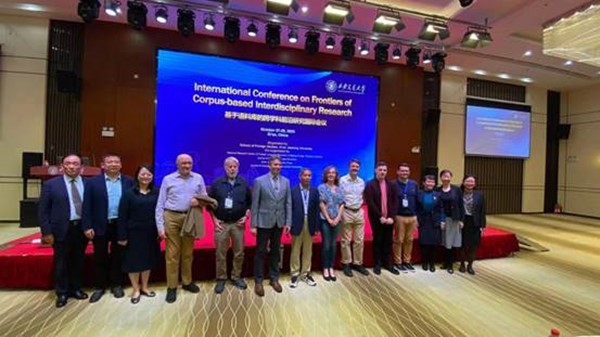
Professor McEnery delivered a speech at the opening ceremony. He outlined the trajectory of the development of corpus linguistics. From its early beginnings with relatively modest datasets and few tools to exploit them, corpus linguistics has grown to the extent that there seems to be an endless choice of corpora and a wealth of tools to process them. However, he argues that a key feature of the future of corpus linguistics will be to focus on what cannot be done with existing corpora and tools – rather than becoming an approach to the study of language limited by the possible, corpus linguistics has always been at its best when it redefines the possible. That, he argues, is in essence the past, present, and future of this approach to the study of language. Yet he also argues that in redefining the possible, there must be a continuous effort to critique and improve the data and tools – if not, in the zeal to expand possibility, there is a risk of embracing the implausible.
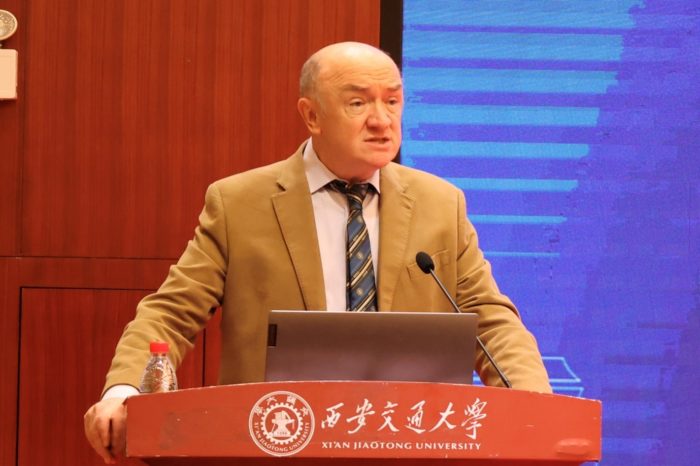
Professor QIANG Yufang of Zhejiang Gongshang University, once a doctoral student under Professor McEnery and a Assocaite Fellow of the Global Chinese Academy, pointed out through her examination of reports on the efficacy of traditional Chinese medicine in several British newspapers that TCM is gaining increasing recognition in the Western world. However, skepticism about the scientific nature of TCM still exists. Based on this, she proposed suggestions for the translation and introduction of TCM knowledge abroad.

The conference featured 14 sub-forums, where delegates engaged in extensive exchanges and in-depth discussions on the research and application of corpora in interdisciplinary fields such as linguistics, literature, translation studies, foreign language teaching, medicine, law, and journalism.
This conference gathered more than ten of the most influential experts and scholars in the field of corpus research from both domestic and international institutions, along with teachers and students from over 110 universities worldwide. The event was marked by intense clashes of cutting-edge ideas and the fusion of academic viewpoints. It was undoubtedly a grand academic event for interdisciplinary corpus research, playing a significant role in promoting international academic exchange, fostering interdisciplinary integration, and strengthening the construction of new liberal arts.

On the evening of November 24th, the 24th lecture of the ‘Foreign Languages and Cultures Forum’ high-end international expert Masterclass series of the School of Foreign Languages was held online via Tencent Meeting. Profesor Tony McEnery participated and was the keynote speaker. He also discussed issues with Professor Culpeper, including politeness in pragmatics, language subjectivity and complexity, and corpus-based pragmatic research.

Note: Photos and texts have been provided by the organizers of events.
- Click here to view Global China Academy Council Chair Professor Tony McEnery’s Academic Activities in Hong Kong and China, 2024.
- Click here to view Global China Academy Council Chair Professor Tony McEnery’s Academic Activities in China, April-May 2023.
- Click here to visit Professor Tony McEnery FGCA page.
- Click here to visit News section.

